#tom pomposello
Photo

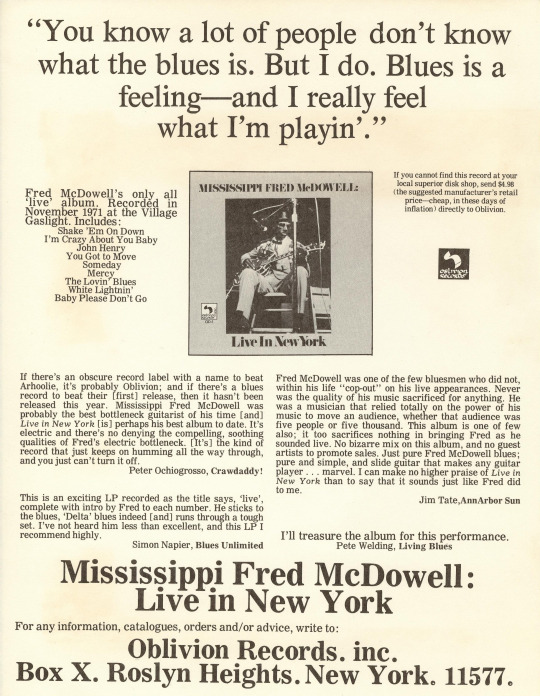
One day, I asked Tom Pomposello why the Living Blues magazine in its original 1970s era was designed so poorly.

I wasn’t being snobby, I think I was just used to the slicker graphics of the vinyl LPs of rock groups or jazz labels.
“Fred,” Tom said, “it’s the blues.”
Understood. But I was a suburban kid who was definitely not really the blues, so I redesigned Tom’s distinctly bluesy flyer for Fred McDowell’s Live in New York.
Is there a right or wrong way? I’m torn. You decide.
4 notes
·
View notes
Photo
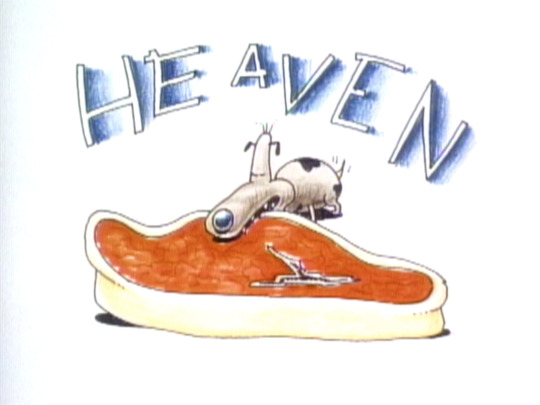
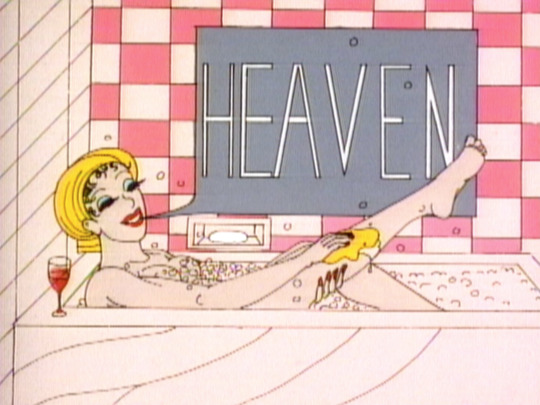
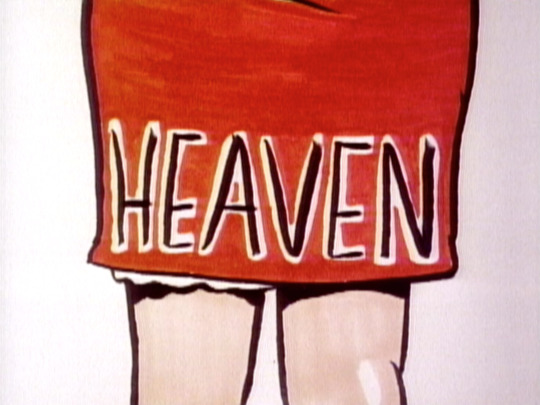
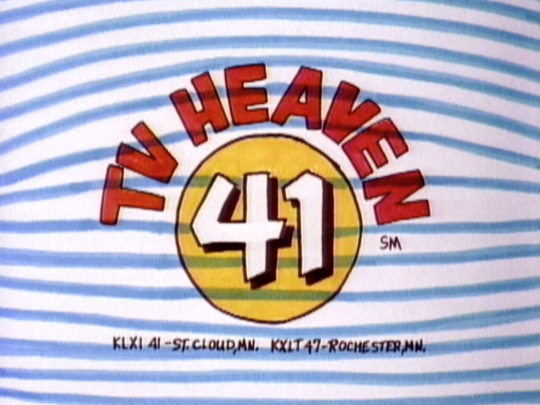
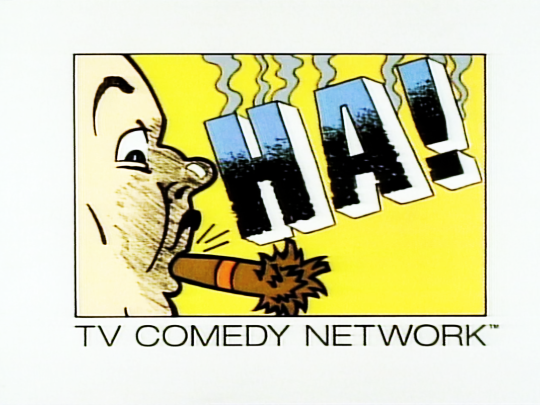


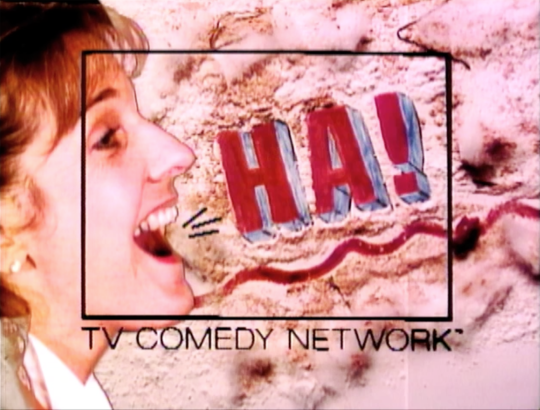
Network Branding 1988-1990
The Best of Original Cartoons
TV Heaven and HA! TV Comedy Network
Fred/Alan, Inc. New York
For a quick minute in the late 1980s, Nickelodeon's ad sales group could not sell Nick-at-Nite advertising ("no one wants black and white reruns!"), so they decided they'd promote themselves as a comedy network.
So, my Fred/Alan partner Alan Goodman and I brought our original idea of TV oldies to a broken down UHF channel in St.Cloud, Minnesota, and renamed Channel 47 "TV Heaven." We got more publicity in three weeks than Nick-at-Nite got three years. Nick-at-Nite parent MTV Networks threatened to fire us from all their networks and we had to resign TV Heaven.
But not before we made some awesome station identifications with our indie animation friends.
In 1990, MTV Networks revived the idea of an all comedy network in a panic after HBO launched the Comedy Channel. Fred/Alan convinced MTVN to brand theirs as HA! The TV Comedy Network, and we went to work.
(Neither The Comedy Channel or HA! succeeded and they merged, Fred/Alan named the venture "Comedy Central" and the rest is comedy television
history.)
.....
Creative directors: Alan Goodman & Fred Seibert
Producer: Tom Pomposello
Logo design: Noel Frankel
.....
TV Heaven station identifications 1988
Production companies: International Rocketship,
Vancouver BC; Fred Mogubgub, NY.
. . . . .
HA! network identifications 1990
Production companies: Lou Brooks & Jerry Lieberman,
NY; Charlex, NY; International Rocketship, Vancouver
BC; (Colossal) Pictures, SF; Marc Karzen, NY.
.....
Pages 256-259 “The Best of Original Cartoons-Produced by Fred Seibert”
#7 The FredFilms Professional Library (Amazon)
#Best of Original Cartoons#HA!#TV Heaven#1988#1989#1990#Alan Goodman#tom pomposello#noel frankel#Fred/Alan#Fred Mogubgub#Marv Newland#International Rocketshi[#lou brooks#Jerry Lieberman#Charlex#Mark Karzen#The FredFilms Professional Library
1 note
·
View note
Photo

(Originally posted on LinkedIn December 13, 2022)
Side hustle? Actually, a hobby.
My day job is producing cartoons, the longest of the "five lives" in my official biography. But the pandemic gave me a kind of freedom to revisit some of my past passions. In particular, my life in producing jazz recordings. No commuting to or from work, no breakfasts, lunches or drinks. At least four extra hours a day. Enough time to get into a little trouble. Some would say a side hustle, some would call it a hobby.
50 years ago, two friends of mine and I decided to start a record label –Oblivion Records– in the back of a hippie record store one of them owned. We suspended operations four years later, realizing our enthusiasm was no substitute for knowing how to run the business, and it wasn't until the digital music revolution of the 21st Century that I got our six records back into the marketplace where they've performed better than I could have imagined.
This year, I actively revived Oblivion with the digital drop of a two hour concert album I recorded in 1973. Composer and pianist Cecil Taylor (1929-2018) is one of the three major avant-garde, free jazz artists –along with John Coltrane and Ornette Coleman– who reinvented one of America's most vital and satisfying art forms. And word just came that the jazz bible DownBeat, will be the first to announce the album as one of the best historical releases of the year (UK's The Wire will follow, as will others*). On behalf of the concert musicians –Cecil Taylor, Andrew Cyrille: percussion, Jimmy Lyons: alto saxophone, Sirone: double bass– I'm honored.
Some –many?!– would ask "why?" Why release a 50 year old musical performance? Why release an album of an artists barely anyone has heard of? Why digital only, you make no money?
All good questions, I suppose, and my answers won't be entirely satisfying.
It's rare in one's life that you could be involved in history. At least, that's true for me. I've had some amazing, groundbreaking experiences in television, animation and streaming video; only time will tell how they fit into culture. But, time has already given a thumbs up judgement on Cecil and I was beyond lucky to have some tiny involvement in it. Over the past half century he went from being barely able to fill a small jazz club to a concert star of the highest caliber. He was a true artist who incorporated modern dance (yes, he also danced at many of his performances), fashion, and a completely unique approach to his instrument, his compositions and his band leading. He appeared across the globe to rapturous audiences –which, due to his steadfast vision, often included grumbling walk outs– and was in demand until he passed away in 2018. Remembrances and reassessments of his life's work followed from all over.
Cecil Taylor fit neatly into the Oblivion ethos. In the infinite wisdom of youth and the idealism of the early 1970s, Tom Pomposello, Dick Pennington and I thought the major companies were ignoring talented artists –including Tom– we thought we were worthy. Maybe we could show the world what they were missing. An ad in the back of a local Long Island music rag pointed us in the direction of a record pressing plant a few miles away, we bought a book that described how to design a cover, and edited a live recording of country blues legend Mississippi Fred McDowell to be our first release. More blues, traditional jazz and electronic (soon to be maligned as "fusion"), and Tom's American roots album followed in the next few years. We sold enough McDowells to keep it in print, borrowed money from ourselves and friends for the others, and even had a hit that basically put us down on the mat.
All along the way I recorded other jazz artists at my college radio station and one day I was asked if I could find some equipment to record Cecil's hometown "return" to New York City after years as Midwest university professor. You bet! It didn't matter that this was a no-pay gig. Honestly, I had to borrow the cash from my roommate/benefactor/recording assistant Nick Moy for the cab ride downtown, but the chance to work with a world class, world famous artist was more than A-OK for a 23 year old fan. Not for nothing, Cecil had a worldwide rep but this period was only the beginning of his actually becoming a global star.
So we're clear, Cecil's music was never for the faint of heart. An explosive, exacting style, once described by UK writer Val Wilmer as "eighty-eight tuned drums," his seeming random din was already shredding any semblance of "swing" that traditionalists were looking for in their jazz heroes.

Cecil released the second half of the concert, which fit neatly on two vinyl sides, on Unit Core, his own label (no other record company would have him at the time) as "Spring of Two Blue-J's." He had little interest in running a company, letting the album go out of print even after Gary Giddins of the Village Voice (one of its few reviewers) praised it as his favorite album of 1974. The first half of the recording sat neglected on my shelf for half a century. It was 90 minutes of sweet and sour cacophony that wouldn't fit neatly on the mediums of the time, and besides I lacked the proper equipment to even listen to it.
The digital age and the pandemic changed everything. Now, I could go to YouTube and learn to use the recording studio built into my Apple computer in 10 minutes. The music could be mastered in the extra hours lock down had gifted me. And since streaming audio has no time limitations I could drop the release -the unreleased first set of the concert, and the original LP performances, more than two hours of music– in its entirety without any annoying fade outs along the way. (By the way, the nothing annoyed Cecil's aging fans and collectors more. Most of them hadn't bothered to figure out how to get their phones to play on their grand music systems.)
After I figured that stuff out –I was pretty nervous mixing my first music performances in decades– the rest fell into place pretty quickly. Tunecore, a streaming music distribution service, sent the files across the globe and Bandcamp allowed collectors to buy digital files.
Most importantly, my longtime creative colleague Alan Goodman agreed to write the digital liner notes (along with the music, they're available at the Oblivion Records website) and jazz promoter and publicist extraordinaire Lydia Liebman accepted the release for her agency.
Alan's extraordinary writing and Lydia's phenomenal efforts spread the story of the Cecil discovery worldwide. While the original LP was virtually ignored in its time, 50 years of global touring and the cultural expansion of an understanding public had its effect. The music was reviewed in dozens of publications around the world, not only in the music press, but in the New York Times, The Wall Street Journal, NPR and all sorts of general interest media.
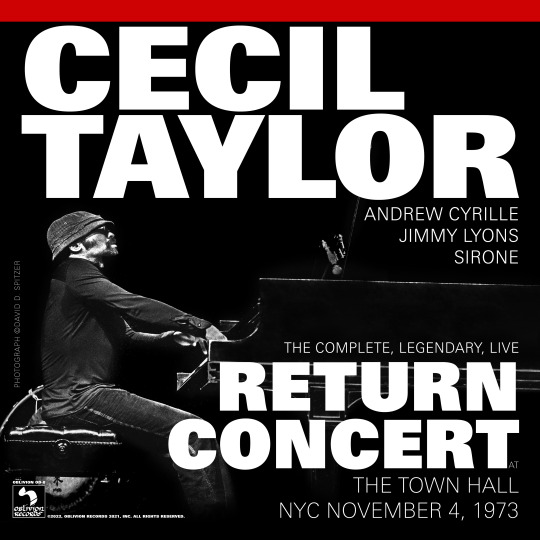
"An exhilarating set of Cecil Taylor's Jazz Arrives, 49 years later." Alan Scherstuhl, The New York Times
"Filling in the Blanks of a Jazz Master's Career." Martin Johnson, The Wall Street Journal
"The biggest bonus track ever!
"The 100th anniversary of James Joyce’s ‘Ulysses’ has folks thinking about other thorny, dense, syntactically intricate classics, of 20th century modernism across all the arts. "Cecil Taylor’s best work, his return concert included, belongs on that distinguished list.” Kevin Whitehead, NPR's Fresh Air
So back to the "why." Cecil Taylor was a important artist, if not a top-of-the-pops one. My partners and I wanted Oblivion to release artists who were significant, if not particularly popular. I had a chance to make my side hustle, my hobby, mean something. Is there anything more satisfying? Not to me.
* PS: This just in. All About Jazz, The Quietus and Glide Magazine just named Cecil's "The Complete, Legendary..." in their best albums of 2022.
#Oblivion Records#Cecil Taylor#jazz#free jazz#avant-garde#avant-garde jazz#piano#1973#2022#album#producingrecords#Produced by FS#WKCR
5 notes
·
View notes
Link
Republican leader in Westchester resigns from post after being caught on camera using racist slur to refer to Democratic town councilman who is Indian American
0 notes
Text
Test
All our releases are available on your favorite streaming services. Or click on the covers below.
Original recordings produced by Dick Pennington, Tom Pomposello and Fred Seibert.
Charles Walker

Mississippi Fred McDowell
Live in New York
Oblivion LP OD-1
1972
Read the stories about the album here.
.....

Johnny Woods
Mississippi Harmonica
Oblivion 45rpm single o#2
1972
Read the stories about the single here.
.....

Friends
Marc (Cohen) Copland
John Abercrombie
Clint Houston
Jeff Williams
Oblivion LP OD-3
1973
Read the stories about the album here.
.....
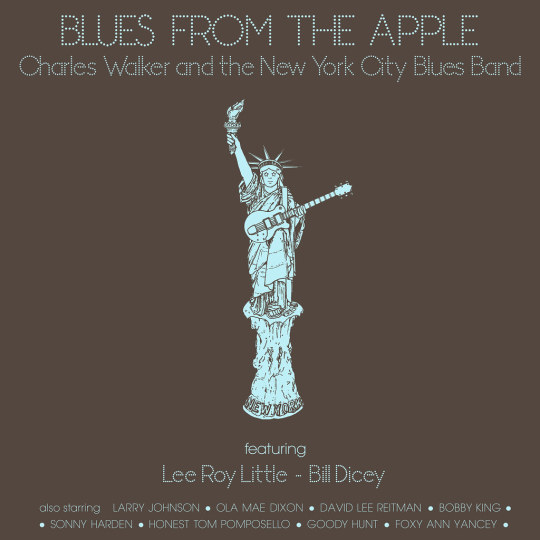
Blues from the Apple
Charles Walker & the New York City Blues Band
Oblivion LP OD-4
1974
Read the stories about the album here.
.....
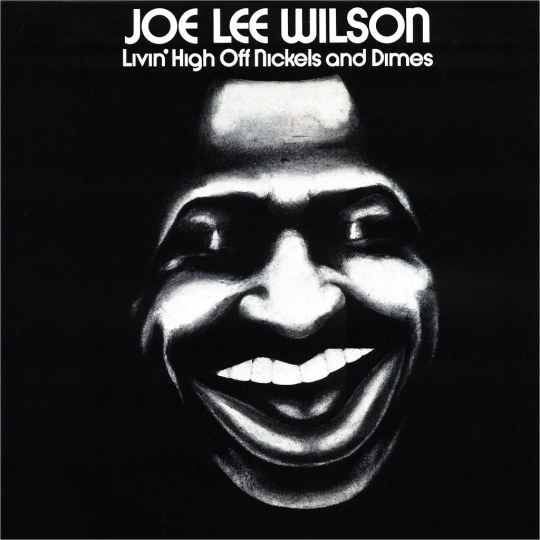
Joe Lee Wilson
Livin' High Off Nickels & Dimes
Oblivion LP OD-5
1974
Read the stories about the album here.
.....

Honest
Tom Pomposello
Oblivion LP OD-6
1975 Read the stories about the album here.
.....
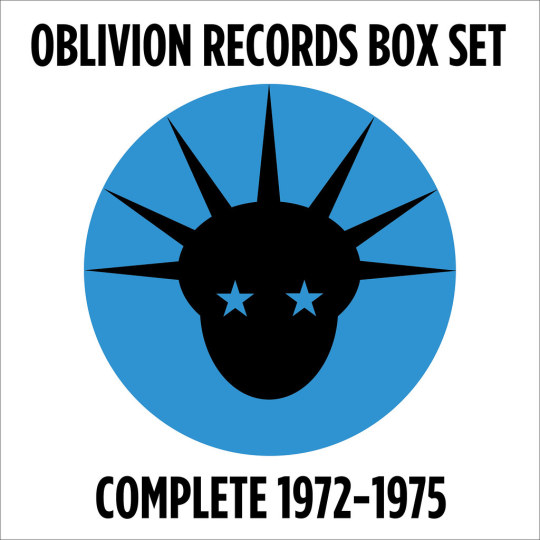
Oblivion Records Box Set
Complete 1972-1975
Oblivion Digitial OD-9
.....
0 notes
Audio
1 note
·
View note
Photo

Even tech robots love the blues!
This story is as much for tech nerds as for blues freaks, but blues freaks everywhere should rejoice what I’m about to tell you.
To summarize the backstory, in the spring of 1972 musician and Oblivion partner Tom Pomposello went to visit his teacher and friend Fred McDowell in the Delta a few months after they gigged together at the Village Gaslight. In addition to guitars, Tom was an accomplished harp player so they traveled to Olive Branch to see Fred’s buddy Johnny Woods. Tom recorded Mr. Woods on a portable cassette machine (!) and Oblivion released a single of the two field performances later that year.
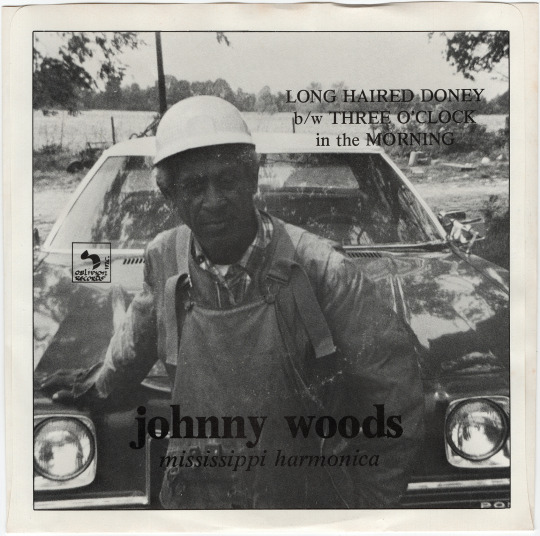
The only camera Tom had was a home snapshot Kodak Instamatic and we used his shot of Johnny leaning against Fred’s Pontiac for the cover. Needless to say, it was funky. But, you know, blues.
Oblivion ceased operations a few years later –we didn’t really know how to run a record company!– and our materials we never stored properly. When the digital age came upon us in the 2000's and I dug out the stuff, the negatives were beyond funky, they were a disaster. As I recounted in the original post about this dilemma, I went to one of the best master printers in America, Chuck Kelton, to perform the surgery. Just look at what he was able to accomplish...magic!
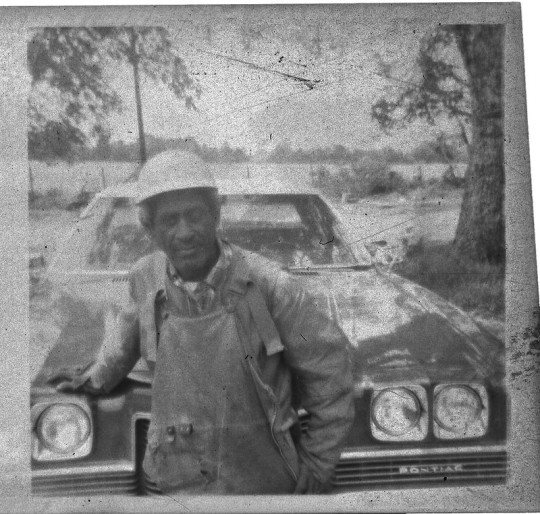
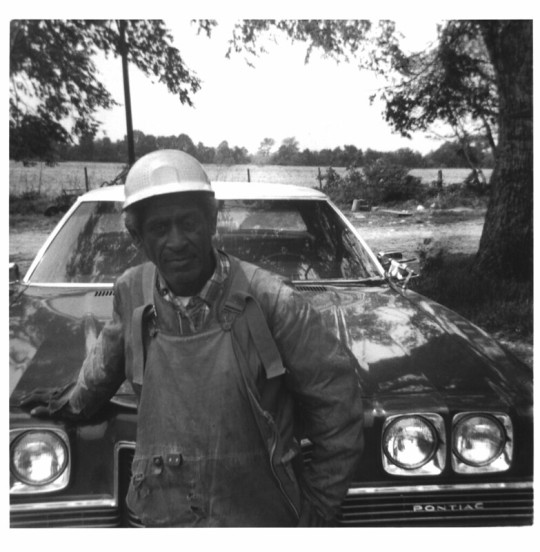
At that point, I declared victory and went home. I cleaned up all the pix on the Oblivion blog, used the Kelton print as the "master" everywhere it was needed. The only thing I hadn't counted on was the march of technology.
Now, we're really heading into geekville. I recently came across an online artificial intelligence site specifically set up for photography restoration.After a few personal tests that blew me away I started thinking it could help me with Johnny Woods. I was always frustrated that as great as Chuck’s mastery was, it couldn’t make up for the tiny, scratched up, 50 year old negative. I was particularly frustrated with the obscurity Johnny’s face and eyes, which were rightfully shielded from the Mississippi sun with his farming hardhat. Here’s what happened.
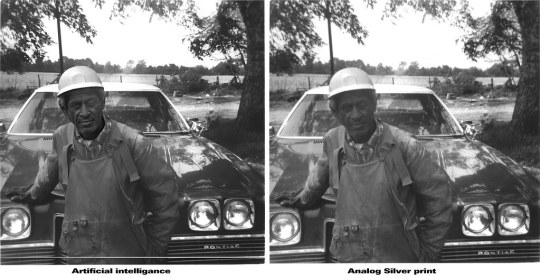
In this posting you have to squint to see the differences, but if you just click the photos you'll be able to get a larger image and see what I'm talking about. But, to me, the difference was stark. Finally! Johnny's face became clear. You can even see sun freckles on his nose. Here, look at this comparison.
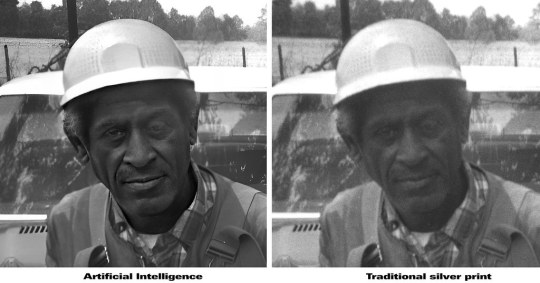
Think about it. Robert Johnson, Sonny Boy Williamson, Muddy Waters down on the farm as a young man. The possibilities are endless!
OK, I've wasted enough of your time. Pass this post around, maybe someone will find a way to restore the blues we've been missing.
7 notes
·
View notes
Text
The roots of Oblivion: Interview with Kropotkin Records, July 21, 1970.

Russian anarchist Peter Kropotkin, one of the inspirations for Kropotkin Records
Oblivion Records really started when a new, hippie record store opened in my hometown, Huntington, Long Island, New York. One of my best music buddies, Mike Altshuler, told me about the joint, and I was so excited that a place with “our” music opened up that I ran right down. Despite my lack of experience I blurted out to the owners that I wanted to interview them on my new college radio show. (If you listen, you’ll hear that none of the three of us were all that accomplished.)
The three of us became fast friends, and less than a year later, Tom asked me to record his gig in Greenwich Village accompanying Mississippi Fred McDowell. And the train left the station and we started Oblivion with third partner Dick Pennington.
The interview below has been edited for clarity.
Interview with Rob Witter & Tom Pomposello, by Fred Seibert 1970
Proprietors of
Kropotkin Records
273 New York Avenue
Huntington, NY
Interviewed by Fred Seibert
@WKCR-FM
Ferris Booth Hall, Columbia University
115th Street & Broadway
New York City
Recorded July 16, 1970, aired July 21, 1970
Fred Seibert: And now, on WKCR-FM in New York, some sounds and thoughts of people from a liberation record store out on Huntington, Long Island. The name of the store is Kropotkin. I hope that some people listening to this will listen closely and take to heart some of the things that these guys are saying. Their names, by the way, are Tom and Rob.
One thing I should say is that the... there are places within the interview where a word sounds very muddled, and that was probably where I had to take a word that was said, and because of some FCC regulations, reversed it, because if we got a complaint here [about] an obscene word, the FCC would have to take some sort of action that wouldn't be good for our station. There were a few places where there was some sloppy editing. My fault. Inexperience. But that's how it goes.
So now, uh, some Kropotkin.
Fred Seibert: Why don't you just tell me what happened, how you got into it and the whole bit.
Tom Pomposello: Well, Fred, it happened this way...
Fred Seibert: (laughs)
Rob Witter: We both, like, grew up in the same town together, and we just knew each other. But like, he was more friendly with my older brother, and so then...
Tom Pomposello: I still am.
Rob Witter: (laughs) Okay. And so then. like, we were joined at this record store like that, you know, it was supposedly the cheapest around then, but it was still ripping them off, 'cause the prices were $3.70, $3.69, or something like that.
Tom Pomposello: Yeah.
Rob Witter: Well, first, see, I worked at this appliance store, like a record store, for about six months, and then this guy came along (laughs) and, uh, we kinda ran the record thing there. You know what I mean? And that way, like, he got in good with some of the distributors and that, you know. And I knew one of the guys from Columbia [Records] a little bit. And, uh, they used to think he was the manager up there.
Tom Pomposello: And there the idea gelled that someday we would open a record store of our own. At that time, we were still straight necks however, and we thought we would rob everybody else just like...
Rob Witter: (laughs) Now we do...
Tom Pomposello: Well, we, we knew would have cheap prices.
Rob Witter: We wanted to make it cheap and like... It was at a time where there weren't, like, too many head shops either.
Tom Pomposello: Yeah.
Rob Witter: It wouldn't have worked. We just didn't know it then.
Tom Pomposello: It would've been a disaster.
Rob Witter: So then like we, we both quit and, uh...
Tom Pomposello: We went away to school.
Rob Witter: Right.
Tom Pomposello: Is what happened. And then around the middle of April of this year, uh, I wrote him a letter, uh, capitalizing on our old plans.
Fred Seibert: Right. How did you happen to pick on the place that you opened up?
Rob Witter: Well, he wrote me a letter and said like, "Definitely Nassau County, [Long Island]." (laughs)
Tom Pomposello: The Roslyn area because there's a lotta bread, man.
Rob Witter: I was thinking about it.
Tom Pomposello: And then we took a look at the rent in Roslyn.
Rob Witter: That's why there a lotta bread. (laughs)
Fred Seibert: Right.
Tom Pomposello: That's why we're, we're capitalist pigs.
He got home at the end of May, and from there we started going.
Fred Seibert: Right. Where'd you get the money?
Tom Pomposello: Well, we put the whole thing together on very little money to begin with.
Fred Seibert: How much did you need?
Tom Pomposello: Um, we put it together on about $1,000, because we knew what we were doing, ha, ha, ha.
Fred Seibert: (laughs) Is that like out of your own personal things, or did you get somebody to say, "Give me some money so I, I can start a record store"?
Tom Pomposello: No. It's from the government.
Fred Seibert: (laughs)
Rob Witter: (laughs)
Tom Pomposello: We got a grant.
Fred Seibert: (laughs) Okay. And have you made it back?
Tom Pomposello: Um, yeah, most of it. We're starting to make it back. Now, most of our money is still tied up in, um, stock.
Rob Witter: We set it up like we had to... have it like, you know, cheap prices and... because we didn't wanna rob anybody and we just... 'cause we were in the same thing, buying records like... and paying exorbitant prices for them. And, um, we just thought it would be, you know, really a good idea, you know what I mean?
We knew it wouldn't be really unique, 'cause like you said, what was it, the, the all-time heavy or something like that, that being the novel idea, it's not... you know what I mean, it's not really novel, but, uh, opening a record store. But we just thought, like, we'd cater to different people if we had to, like you know what I mean, we'd make it like a so-called freak store, but it really wasn't. You know what I mean?
Fred Seibert: Right.
Rob Witter: We knew it wouldn't be either, but you know, it would seem that way, because the prices were low and we weren't making any money.
Fred Seibert: (laughs)
Rob Witter: And we'd come in with our, our, uh, suits from Robert Hall's.
Tom Pomposello: (laughs)
Rob Witter: (laughs) You know, our dungarees and everything.
Fred Seibert: Right.
Rob Witter: And that was it, but just, you know, there's nothing really unique about it, as he says.
Tom Pomposello: Never said that.
Rob Witter: Sure you did.
Tom Pomposello: Okay.
Fred Seibert: Okay. The reason I call it a liberation record store is just because I've read papers that had, "These are liberation record stores, and they have a lot to do with..." They try to say it has a lot to do with politics and the economic system and, and the whole bit.
Tom Pomposello: That's right. Why don't you ask us how we got the name?
Fred Seibert: How did you get the name? I, I looked it up last night, and, and they told me that he was a, a Russian, uh, geographer and-
Tom Pomposello: Uh, he was just a philosopher. Pyotr Alexeyevich Kropotkin.
Fred Seibert: A philosopher. Okay.
Tom Pomposello: 1842 to 1921. Got the bass, that's why.
Fred Seibert: Okay.
Tom Pomposello: Um, basically, um, what we were trying to do was, um, more or less name the store, um, to reflect our own personal beliefs as much as we could. Um, Prince Kropotkin was a, was a Russian anarchist, and in many ways, um, anarchism conjures up to people, um, declaring yourselves against what constitutes the real strength of capitalism, um, the state and its principal supports, you know, the centralization of authority and law, which is always made by a few for a few, and also against a, f- a form of justice whose chief aim is to protect authority and capitalism.
But you see, it's really more than this. Grove Press just, um, uh, republished, uh, “Memoirs of a Revolutionist,” Kropotkin's famous book, and in the introduction, they, they sorta give you the impression, um, of comparing him to Abbie Hoffman of today. In other words, he was a, a, a culture- that, "Is a cultural revolutionary who saw the need for a, a change in people's basic lifestyles," and that's what we felt like doing.
Um, for example, social philosophers like, uh, Arthur Lothstein, make this distinction that, um, society, uh, can be envisioned in terms of a basis structure and a superstructure. Um, base and structure are more or less synonymous, in other words, the relationships entailed by, um, you know, ownership relations, okay? And superstructure being the cultural mores entailed by socialist institutions.
Now, what we wanted to get into was... before you can be a revolutionary and have a, you know, a revolutionary base, you've gotta, I think, first work on... a revolutionary superstructure. And that was the importance of our record store, trying to develop, uh, a kind of alternative institution, um-
Fred Seibert: Like the alternative media.
Tom Pomposello: Yeah. Where, where people could go and get their records, uh, cheaply, or as we put in our manifesto, just come in and rap with us. We have couches in the store. And, uh, our record prices are about the lowest around. (laughs)
Fred Seibert: They are the lowest around. Um, I know anywhere around on Long Island, where the store is, or around New York, I know... that I know of anyway ...unless you happen to get used records, or a super sale... even... super sales have gone up.
Tom Pomposello: Yeah.
Fred Seibert: So you are the cheapest even when they're on, on sale.
Tom Pomposello: Right. Korvette's uh, sale price used to be three cents below our regular price, and now Korvette's, uh-
Rob Witter: 22 cents above it.
Tom Pomposello: Right. It's 22 cents above our regular price.
Fred Seibert: And so you're based on anarchy.
Tom Pomposello: Um, okay, you can say that. We'll let you get away with it. You see, uh, it's hard to say... We're, we're not capitalists the way a whale isn't a fish.
Fred Seibert: Mm-hmm.
Tom Pomposello: You know? It's hard to say that you're not capitalist when you're operating within a, within a, within a capitalist context. There's still that same old, uh, s--t, you know, exchange of money for goods and everything. I...
Fred Seibert: But I was gonna ask you that. I've, I've talked with a few kids and they... one kid said, "Oh, it's a record shop run by a couple of anarchists."
Tom Pomposello: (laughs)
Fred Seibert: And then the other kid that was there said, "Yeah, but they're not really anarchists 'cause look at all this money they're making off of us." Even though they-
Tom Pomposello: Yeah.
Fred Seibert: Some people are convinced that you're trying still to cash in on people, uh-
Tom Pomposello: Yeah. Yeah.
Fred Seibert: ...even though you're doing it in a sneaky sort of way.
Tom Pomposello: Yeah. A lotta people have gotten that impression. We can say very plainly that we don't make a lotta money, we really don't. We work 72 hours plus sometimes on Sundays fixing up the place, and also doing the books. Comes out maybe to 80, 90 hours a week, and we never have brought home more than $40 a piece.
Rob Witter: We've only... First, we've only gotten paid like the last couple... this week. Keeps giving me these little notes, you know.
Fred Seibert: (laughs)
Rob Witter: Saying, "Go out and have a good time, here's two bucks."
Fred Seibert: Right.
Tom Pomposello: Yeah.
Fred Seibert: Do you see... your business increasing?
Tom Pomposello: Yeah, business has been picking up quite a bit. Um, a lotta people are digging the prices and digging the atmosphere, which is what we wanted to happen. Um, I can see people really being uptight about the idea that it is just two guys who, who formed this record store on a formula. They've got long hair and they don't wear suits and ties. And, uh, they formed a record store and they still pump us.
I don't know, people...can be very naïve. Records cost us a lotta money. Uh, we pay the same prices basically anybody else. We get our records for about between $2.60 and $2.70, and we never charge more than $2.97, unless it's a higher list price album or a double album.
And, I don't know, by and large, I would say very, very few people understand what we're doing. People, as I told you this before, either fall into two categories, the type of people who come into our store. A, you know, uh, the invariable question is, uh, how do you manage to sell your records so cheaply? And they think we're schmucks for not charging them like everybody else does. And, the other type of people who come into the store think maybe this store is really revolutionary and they're trying to do something really right-on. And that's just not true either. The store's at a point where all we're really doing, at this point in time, as much as I hate to admit this, is doing favors for people.
It's hard to do... It's hard to do anything other than that... operating within the context with which we're operating. We're giving away free records, free used records.
Fred Seibert: Right. I noticed that. I picked up [some] last night myself.
Tom Pomposello: Yeah. And we're also operating sort of a used record exchange. We get our used records from...
Fred Seibert: Do you buy those from people around the town?
Tom Pomposello: Right. And... there's an outlet in the city where we get it.
Fred Seibert: Is that working out? Do people enjoy that? I know one thing, that people are very upset about from, from the major record stores is that you have to go in and buy a record without listening to it, and the return policy is, is rotten. I know you say you work in a non-return policy.
Tom Pomposello: Well, by non-return policy we mean that when we buy from our distributors, we can't return merchandise, with the exception of defective merchandise. If we were to work on a return policy, we would be paying 20 cents more for our records. It's a privilege which you have to buy.
Fred Seibert: Do you [take] returns ... from kids, if they're defective?
Rob Witter: Kids bring in like open records and say they didn't like it and we can't really take them back, you know-
Fred Seibert: Right.
Rob Witter: ... because, 'cause then... 'cause all it takes is 10 records to, to pay for that.
Fred Seibert: Right on.
Tom Pomposello: Not because we're mean you-know-whats.
Rob Witter: Yeah, right.
Fred Seibert: Right. I suppose that's why some of the stores have a 50 cent or 75 cent return charge.
Tom Pomposello: Yeah. Uh, because a, a store like Goody's does that. And they can get away with it because, uh, they can just return a whole slew of merchandise as defective and nobody would ever look Goody's in the eye.
Fred Seibert: Mm-hmm.
Tom Pomposello: That's an interesting thing to talk about later on. How we, we suspect that Goody's is gonna pressure us.
Fred Seibert: Okay. I, I wanted to ask... You said you're here as an alternate form of, of, uh, business. I guess you have to say you cater mostly (laughs) to the young.
Tom Pomposello: Yeah. We really sneered when, when that ... phony plastic hippy shop down the street from us, “Hangups,” ran ads in... the stuff that's getting passed off as alternate, you know, alternative newspapers.
Rob Witter: Well, I don't... They, they've expanded into three or four stores. And, uh, I remember when they first opened up, it was, uh, an exciting event around... around the whole area, in fact, 'cause they were the only ones around. And then they started to expand from posters into clothes and...
Tom Pomposello: And exorbitant prices.
Rob Witter: Exactly.
Tom Pomposello: Yeah, that's about where it's at. You see, they, they did a, uh, uh... They bought time on [W]NEW-[FM, New York]...
Rob Witter: I know, I've heard it.
Tom Pomposello: ...recently. And the ad went something like, uh... They did it in cooperation with Limbo and something else like that.
Rob Witter: Mm-hmm.
Tom Pomposello: And the ad went, "A new kind of capitalism based on, uh, cooperation, not competition." We really sneered and laughed at that and thought it was really startling. But when it comes right down to it, that's what we are more or less. It's very, very hard to say that we're a new kind of alternative institution. We like to think of ourselves like that, but we're really not.
Fred Seibert: For the area, you are.
Tom Pomposello: Well, that's because our prices are so cheap, but big deal. See, what's really happening, um, I pay the same price for records, and maybe even more, say, than a place like Goody's because I don't have their buying potential. We pay the same price and we make all this money, the, you know, the $2.60 we make or the $2.97 we charge on a record, we see maybe 37 cents of it. You know? Which a good percentage goes to overhead.
Fred Seibert: Uh-huh.
Tom Pomposello: Um, the other $2.60 goes, you know, to make Capitol Records, and Columbia Records, and RCA Records rich. You know, got to keep the war rolling along.
Fred Seibert: (laughs) Um, well, anyway, do you see that you're gonna do anything with it? Uh... have you bothered the other record stores? Have they said anything? Very nearby there's a, a big Huntington record institution, as far the people are [concerned], you know, they bring all their stereos there to be fixed and they buy their records and ...the store never has the records you want, and...
Tom Pomposello: Yeah.
Fred Seibert: They do charge a little less than Sam Goody now.
Rob Witter: Yeah, well, we got visited by them.
Fred Seibert: Really?
Rob Witter: Yeah. One night. They didn't tell us who they were, but they came in like, and they pointed to a record that like nobody who was like 55 would know about.
Tom Pomposello: Yeah, it was the, the new Traffic album.
Rob Witter: Yeah. Yeah, it was, "Is this the new Traffic?" You know.
Fred Seibert: (laughs)
Rob Witter: And it floored us, you know. There [were] a lotta people in the store, and everybody was kind of looking at them anyway.
Tom Pomposello: Yeah. A funny thing is, he bought it from us for $3.57.
Rob Witter: (laughs)
Tom Pomposello: It obviously wasn't for him. He could just go sell it in the store the next day for $4.89.
Fred Seibert: Right.
Rob Witter: (laughs) Still make $1.40.
Fred Seibert: (laughs) Um, have they said anything to you though? I mean, officially.
Tom Pomposello: Yeah, the day we opened we contrived all these letters from all the record stores in the area, uh, you know, letters of resignation.
Fred Seibert: (laughs)
Tom Pomposello:
Yeah. We wrote... Well, we forged one letter from this store. You tell him the letter, 'cause you made it up.
Rob Witter: You made that up.
Tom Pomposello: Oh, okay. Well, anyway, it said, the letter said, "Dear Kropotkin, we give in. Good luck in business, and then we signed it, uh, forged the signature. So if they're listening, they can get us on libel. Um...
Fred Seibert: Well, didn't they see it when they went in the store?
Tom Pomposello: They saw it.
Rob Witter: ...and then...Yeah, the old lady walked out. She was laughing, 'cause I was sitting on the steps, and...
Fred Seibert: But they haven't said anything besides...
Rob Witter: No.
Fred Seibert: And you say you foresee Goody's pressuring you, have they?
Tom Pomposello: Uh, we haven't, we haven't had any pressure yet.
Rob Witter: I think somebody visited us from there.
Tom Pomposello: Oh, that's, yeah, that’s [right].
Rob Witter: This guy drove up in a Cadillac or something. One time. This is just one. You know, he walked across the street, looked in. There's nobody in there and he laughed, walked back to his Cadillac and drove away. You know... (laughs)
Tom Pomposello: We've been very fortunate, I think, all the times we've gotten visits there've been like around 30 people in the store, so it's looked really good.
Rob Witter: Well, it's good.
Tom Pomposello: But you see, Goody's is such a big outfit, um, that what I could see happening, um... Maybe I'm really projecting this and building it up to a point where, um, you know, I'm ego-tripping and thinking how important we are, you know, it's just not true. I think we could, we could do maybe $3-4,000 worth of business a week and not dent what Goody's doing.
Fred Seibert: Right.
Tom Pomposello: Um, all they've gotta do probably is say the word and exert a little bit of pressure on our distributors and, uh, we stop getting the albums we want when we want them.
Fred Seibert: Do you think that will happen?
Tom Pomposello: Um, it's really hard to say. I really don't know. See... I read the article that you were talking about earlier too, in Rolling Stone. As a matter of fact, that, that article did influence us in many respects. Not the article as much as the people, because I'd heard about this before I read it in Rolling Stone.
Fred Seibert: Mm-hmm.
Tom Pomposello: Um, it's really hard to say, because nobody out here on the island has tried what we've tried. I suspect that a lotta other people will, because... a lotta times we do give the impression in the store that we're doing really well, because it looks like there's a lotta people and a lotta people buying records. But I mean, you gotta sell... We've gotta sell three albums to make a dollar.
Fred Seibert: And like you said, it goes to overhead. And [has] your landlord said anything?
Tom Pomposello: No, not at all.
Rob Witter: He hasn't... he just-
Tom Pomposello: We're after him to put a bathroom in.
Rob Witter: Yeah.
Fred Seibert: (laughs) Has most of your stuff been from kids in the immediate area, or do you get them from other parts of the town?
Tom Pomposello: Yeah, we-
Fred Seibert: Huntington Township is very large.
Tom Pomposello: Right. Mainly from Huntington, although there are still people in Huntington who don't know about us.
Fred Seibert: True.
Tom Pomposello: What a shame. And-
Fred Seibert: Well, what, you've been open six weeks now?
Tom Pomposello: Yeah.
Rob Witter: Yeah.
Fred Seibert: Give yourself a chance. I mean, you know, you're getting-
Tom Pomposello: We did have a kid hitch in from... He hitched in from Flushing [Queens, NY] with an order that he took from his friends for about 20 records.
Fred Seibert: How long ago was that?
Tom Pomposello: Oh, about two weeks ago. But, he heard about it from a relative who was in Huntington. So I mean, the word just hasn't reached Flushing. Well, it will...
Rob Witter: Another guy from Syosset [Long Island, NY] too. Another guy from Syosset came down to get some.
Fred Seibert: Are you gonna do any... advertising?
Tom Pomposello: Yeah, we've done some advertising.
Rob Witter: Yeah, we had one in the [Long Island] PennySaver just recently.
Tom Pomposello: Mm-hmm.
Rob Witter: And we really haven't seen the effects of it yet, you know, business hasn't increased or anything.
Tom Pomposello: Advertising is expensive as hell.
Rob Witter: Yeah.
Tom Pomposello: That's what the problem is. And we've depended mainly in the past on... our flyers, our groovy little flyers and word of mouth.
Fred Seibert: Right.
Tom Pomposello: And it's been pretty effective, but, um, there's no question about it, we've gotta get some kinda advertising out, because people have gotta know about us, and we've gotta increase our volume a bit if we're gonna stay in business.
Rob Witter: Mm-hmm.
Tom Pomposello: Uh, we can we can live on $50 a week. It's not, it's not as hard as you might expect. We both have cheap apartments.
Rob Witter: Yeah.
Tom Pomposello: And, uh, food is expensive.
Fred Seibert: Right.
Tom Pomposello: Especially with a baby, but we're making it. We'll do it.
Fred Seibert: Um, okay. Think you'll put anybody else outta business?
Tom Pomposello: No.
Rob Witter: No, definitely.
Fred Seibert: Definitely not?
Tom Pomposello: I know we've seriously dented the business of that other record store that's in town, but it's not... again, it's not primarily a record store. It's primarily a, a stereo...
Rob Witter: TVs.
Tom Pomposello: Yeah.
Fred Seibert: What do you see as your ultimate goal that you'll never reach? Putting Sam Goody out of business?
Tom Pomposello: Well-
Rob Witter: Well, that was just, you know. (laughs)
Fred Seibert: Yeah.
Rob Witter: Wishful thinking. But like, no, it'd be nice like a lotta kids like, have asked us like about other record stores, and like... You know what I mean? Like they ask us how we set it up and that 'cause they can talk with us. You know what I mean?
Fred Seibert: Right.
Rob Witter: And so like it would be nice like if say we can't pull maybe from the south shore, so great, 'cause there is... like there's so much potential all over, you know? Like maybe somebody opening up one down there would be nice. You know what I mean? And then if there was, say, a group of us, you know, like who felt the same way.
Fred Seibert: Then maybe you could put some pressure on people.
Rob Witter: Right. Then it would put some pressure on them. But one store and local, in just one local area isn't gonna do anything really, because like, it's like (laughs) so many people, like, and records are so powerful, like, you know, everybody's getting them.
Tom Pomposello: See, we re- we really are not primarily doing this to put anybody out of business, although I wouldn't mind putting anybody out of business because they're robbers and they deserve to be put out of business. Uh, I mean, I really question the legitimacy of a place like Goody's with the, with the buying power, uh, w- where they can buy, uh, you know, 1,000 records that they're sure are gonna go for, for two bucks a copy, maybe not that much, maybe 2.30 a copy, and then selling them for f- you know, for 4.09. I mean, that's really outrageous. And it's not-
Rob Witter: Definitely.
Tom Pomposello: And Goody's isn't just doing it, uh, on, uh, records. They also have a tape department, where they really rack up, on an instrument department, and, uh, tape and stereo equipment.
Fred Seibert: Do you, um, do you see any day where, where there'll ever be enough of you to get together and say something to the record manufacturers?
Tom Pomposello: No. (laughs)
Fred Seibert: Never.
Tom Pomposello: Quite frankly, no.
Rob Witter: We'll be out of it by then, probably. (laughs)
Tom Pomposello: Uh, we should tell you about the things that go on with, with our, with our distributors. I walked into our distributor one day to pick up some records, and the Capitol Records salesman and the Columbia Records salesman were both there, and they just could not believe it. You know, when we come in, we're like the standing joke at the distributor.
Rob Witter: (laughs)
Tom Pomposello: Cannot see how two guys with long hair can make it in the record business. And, uh, you know, th- they ask us the same questions, "How can you sell them so cheap then? You don't sell accessories. You don't make money on anything else. How do you do it?" And it just blows their mind that we're willing to work 72 hours or 80 hours a week for like $50, because to them, that's failing. (laughs)
Rob Witter: Exactly.
Tom Pomposello: That's bankruptcy to them.
Rob Witter: Exactly. Degenerate hippies, get a haircut.
Tom Pomposello: Yeah.
Rob Witter: You know? Then make it in business.
Fred Seibert: Okay, um, you said you had some things you want to talk about.
Tom Pomposello: I'll prove to you how it's not a liberation record store, but it tries to be. Um, okay, are we a liberation record store? Um, Hayden, in his, h- his book on the trial, which was just published in Ramparts... I don't know why I put a plug in for them, those robbers. Okay, you can leave the plug in. It doesn't matter.
Fred Seibert: Okay.
Tom Pomposello: Um, outlined, um, in, in the last part of his book, the direction that he thinks the left has gotta go, go into right now, and, um, he, he stated four conditions for what a liberated zone or a liberated area, or if you wanna apply it to a liberated store, what would it consist of. So let me give you the four, um, conditions, and you tell me where you think we fit, 'cause I really don't know if we fit any of them.
He said, "First, they will be utopian centers of new cultural experiment. Second, the territories will be internationalist. Cultural experiment without internationalism is privilege. Internationalism without cultural revolution is false consciousness."
Fred Seibert: You could apply there.
Tom Pomposello: Uh, yeah-
Fred Seibert: I mean, if you can apply a record store to internationalism.
Tom Pomposello: Yeah, I agree. Um, third, he said that the territories would be centers of constant confrontation. Uh-huh. "Battlefronts inside the mother country." And fourth, he said that, um, they would be centers of survival and self-defense. See, the only thing I- I- I can see us applying to at all would be, um, utopian centers of new cultural experiment. Leave out the utopian, say, centers of new cultural experiment.
Now, you've gotta ask yourself two questions, first of all, as we put in our manifesto, music is an integral part of our culture, and like much of our culture, robber barons have fixed it so that we must pay exorbitant prices for our, you know, for our music. Um, is music really part of our culture? I really question that.
Fred Seibert: You do?
Tom Pomposello: Mm-hmm.
Fred Seibert: Okay. Why do you question? I, I personally think it is.
Tom Pomposello: Yeah.
Fred Seibert: I think it's getting to be maybe at this time, at this point in time, an overbearing part of our culture.
Tom Pomposello: Okay. It brings a lot of people together. And, uh, maybe it's radicalized a lotta kids, if not politically, at least musically.
Fred Seibert: Right. Definitely musically.
Tom Pomposello: Okay. However, as we were saying before, um, you know, when I have to pay 2.60 to get an album, and the groups, the heavy rock groups that we're s- we're looking to as our idols and our-
Fred Seibert: Right.
Tom Pomposello: ...right-on revolutionary brothers, um, are not boycotting record companies that, um, are, are charging, you know, people 2.60 for the records and then having them j- jack up from there. Maybe that's impractical. We've gotta ask ourselves what we're doing at this store that's so important. Are we wasting our time?
See, we're not in this pri- primarily just to have something to do. This record store wasn't supposed to be an occupation for, for the two of us. Um, for the two of us, it was gonna be more or less a, a front for our politics, and a way to do something revolutionary. This is about the closest we could get. And, uh, what I'm saying is I- I'd hate to see our store stagnate at this point, and I wanna see it take on new directions, but, uh, it can't unless we all get together and do it. And that's what... That was my... you know, w- what I was saying about the artists in the business, who, uh, are also a great... in, in, in a great way responsible for, um, the prices, which are outrageous. There's no question about it. Even 2.97 is outrageous. There's still no question about that.
Fred Seibert: Definitely. Do you want... You were saying something before.
Rob Witter: Yeah, I was jut gonna say like the one example of how, uh, the using the music like it's coming out there as a part of, say, the new culture or something like that, and trying to push it as that is like on the Chicago album they say, "We put all our energies and our forces into the revolution, and all those connected with the revolution." You know what I mean? And (laughs) that's Columbia too, you know, I mean-
Fred Seibert: Right.
Rob Witter: ... Columbia is at, boy, they know where it's at. You know what I mean? And then they keep, you know... They're not doing it though.
Fred Seibert: Well, so-
Rob Witter: It's ridiculous.
Fred Seibert: Well, Columbia is using it as a- another gimmick to make money.
Rob Witter: It's a hype. It's a hype.
Fred Seibert: Right.
Rob Witter: That's what it is. And they... Everybody, you know, says Chicago is where it's at.
Fred Seibert: Right.
Tom Pomposello: The, the culture is the most easily exploited thing.
Fred Seibert: Are you looking at your record store, you say, as a front for your politics.
Tom Pomposello: Right.
Fred Seibert: Is that eventual like going in through a social type of, of, uh, upheaval through your politics there? You're not being blatantly political where you're-
Tom Pomposello: Exactly.
Fred Seibert: ... where you've got, uh, signs up in the store, "Kill the pigs."
Rob Witter: It would be nice if we were like a little bit, well, powerful, maybe, a little bit, at least show some signs of power, like in the community, but like everybody goes, "Kropotkin, (laughs) Kropotnik," or something like that. (laughs)
Fred Seibert: Right.
Rob Witter: Laugh and sneer, you know. Everybody, they say, "No problem. Just let them go." You know what I mean? We'll never go anywhere.
Fred Seibert: Have you gotten anything from, um, from the, uh, "straight world" where, uh, people have come in and say, "Ah, you're gonna go out of business in two weeks," or-
Tom Pomposello: Oh, all the time. Not so much from the, from the straights who come in, because they really don't know what the record business is all about, but from our distributors all the time. It's one of the reasons why we're having such a hard time getting credit extended. More or less, we're operating on a COD basis.
Fred Seibert: Mm-hmm. Can you... or, do you find that you'll be able to afford to do that for long?
Tom Pomposello: Oh, yeah, it's no problem. It's a pain in the neck more than anything else. It's not really a problem.
Rob Witter: It's really hard though. (laughs)
Tom Pomposello: It's just that, uh, you know, you've gotta budget yourself, and, you know, you can't buy records on Saturday, and Saturday is your biggest day, so consequently you've gotta balance your money so that you'll have enough to give a big order for Friday.
Fred Seibert: Right.
Tom Pomposello: It's a pain in the neck. When in reality you should be able to order... I mean, they even find this hard to extend us this amount of credit, where we can give a big order Friday, pay half of it on Friday and pay the balance on Monday.
Fred Seibert: Right.
Tom Pomposello: Which I mean, you know, they really wanna be sticklers. I think they would like to see us go out of business. Yeah, our distributor laid it right on the line to us, when I wanted to open an account with us, and he wanted to know more or less what we were doing, 'cause he thought it was pretty strange, again, that young guys with long hair could try and do a big time operation. How he got the impression we were a big time operation I'll never know.
Rob Witter: (laughs)
Tom Pomposello: But he did lay it right on the line when he said to me, "I'm a businessman, and, uh, I sell a commodity for a certain price, and it gets resold for a certain price. You're cheapening the commodity that I deal in." You know?
Fred Seibert: He really thought that?
Tom Pomposello: Yeah.
Fred Seibert: I don't know, from his point of view, um, he should be very happy. He's getting that much more money from your business, uh, if, if that's what he's looking for.
Tom Pomposello: Uh, the way he looks at it is that we're hurting the entire record business on Long Island.
Rob Witter: Probably because like, as Sam Goody keeps going up, then maybe, like, uh...
Fred Seibert: He can go up.
Rob Witter: He can go up too, or something.
Tom Pomposello: Exactly.
Rob Witter: Right. You know. He can like, instead of making 40 cents on a record, he can make 50 cents...
Fred Seibert: Is he the same distributor that distributes Goody?
Tom Pomposello: No.
Rob Witter: Nah. No. He's not big enough really.
Fred Seibert: Is this the only available guy?
Tom Pomposello: No, we have, we have a number of distributors.
Rob Witter: Yeah. Yeah.
Fred Seibert: Uh-huh. Are any of them more cooperative?
Tom Pomposello: One of them is. One of them is more or less becoming kind of a personal friend to us.
Fred Seibert: This is Tuesday Night at the Movies with Fred Seibert. We're on WKCR-FM radio in New York at 89.9 on your dial. And we've been talking with some people from a liberation record store, Kropotkin, out on Huntington, Long Island.
The article that, that you were talking and I was talking about in Rolling Stone, [the] most important thing they stressed was get a good distributor who is sympathetic.
Tom Pomposello: Impossible.
Rob Witter: Yeah, it's really hard to, because they're all out to really...
Fred Seibert: Is that around here, or...
Rob Witter: Well, we don't know. I mean, really, we don't know how it is elsewhere, but it probably is the same. You know what I mean? Everybody's just out to burn. You know what I mean? They all, you know, they'd like to... Well, they don't really wanna put us out of business, but like, they'd like to turn us into what they are, you know what I mean, and help them make more, and they'll help us make more, or something like that.
Fred Seibert: Right.
Rob Witter: Rob everybody.
Fred Seibert: Right. So you're not really, uh...
Rob Witter: That's the cooperation.
Fred Seibert: ...too optimistic about them?
Rob Witter: No, not too much. No. It'd be nice if like somebody could open up a... Well, it'd be hard, like start maybe from a company, a distributor, and- (laughs)
Fred Seibert: I was, I was gonna say-
Rob Witter: ...don't get along.
Fred Seibert: I was just about to say, can you see some day, like you said, more people open up, then eventually maybe a distributor will open up, a freak distributor, whatever you want to call it.
Rob Witter: It's pretty hard.
Tom Pomposello: It's mostly impossible, because of the tremendous amount of capital involved, and we're trying to get away from tremendous amounts of capital.
Fred Seibert: There's no way, um...
Rob Witter: But look, suppose like the only thing he could do that would be really... that would help, would be only to deal with us, and that would be, you know... (laughs)
Fred Seibert: Well, I said, if, if you opened up... If somebody opens up many, uh... If, if more kids open up stores, say around the island...
Tom Pomposello: Yeah. I would personally like to see more kids do what we did in different areas, certainly not in Huntington. (laughs)
Fred Seibert: (laughs)
Tom Pomposello: Um, but I would like to see more people do what we did. I do know that it'll be extremely hard. This sounds terribly immodest, but it is true. If we didn't have the background that we had in the record business we would've never been able to pull it off. We had a few lucky breaks. Um, we also knew how to [open at] the right time and the right place. And also we were very fortunate that we didn't get shafted, although there were many times when people tried to shaft us.
Rob Witter: It'd be hard like, if you were like, say, you worked at Sam Goody's and one of those guys that walks around, and I don't know what color shirt he wears or something like that, and say like then a year later, he would do it, but I imagine that like that he never sees anything except for like records.
Fred Seibert: Yeah.
Rob Witter: And just like watches people. You know what I mean?
Tom Pomposello: And it's not just a matter of knowing records-
Rob Witter: Yeah.
Tom Pomposello: ...and what sells.
Rob Witter: That's like the... That's nothing really. That's like the easiest part. See, you know, you can get like where we are, like we have, uh, Dud's Corner, like you were telling, like stuff that doesn't move.
Fred Seibert: Right.
Rob Witter: We have to get rid of it, because we can't keep anything. We can keep stuff, but it's like somebody'll always come in. You know what I mean? And that'd be nice to get to the point where we can like carry a lotta records and expect like someone to come in at least once a week and maybe ask us for it. You know. People are really stunned like when they ask us like if they have somebody like, uh... Suppose they said Cat Mother's first albums, like that, which isn't selling now, you know. We didn't have it, like we say, "We don't have it." And then, you know, "Take 'em back."
"What."
"Yeah, you don't have it?" And that. It's really...
Tom Pomposello: Yeah.
Rob Witter: It's really crazy.
Tom Pomposello: All in all, what we're trying to say is that we're very fortunate that we didn't flop.
Rob Witter: Yeah.
Tom Pomposello: And we haven't flopped. By our standards, we're successful. By, uh, our bourgeois establishment standards, we're a flop. We were a flop from the day we opened and we always will be a flop.
Rob Witter: (laughs)
Tom Pomposello: But by our standards, we're, we're making out fine, and we're very... both of us are very satisfied. Um, I'm not trying to dissuade anybody from doing what we're doing. As, as I said before, I'd like to see a lotta other people do it, because that's what we've gotta do.
Fred Seibert: Sure.
Tom Pomposello: Um, then again, if you're not... if you do consider what we are, an alternative institution, um, if we're not, and we're probably not, then we've got no right doing what we're doing. Like I said, the only way I can envision us is people who are doing people like us a favor. And that's all the legitimizing I need for being in the business that I'm in.
Fred Seibert: Right.
Tom Pomposello: See, again the concept of whether or not the store is a front for our politics has to be answered in terms of two questions. I mean, are the records that we handle radical? Is there such a thing as radical records?
Fred Seibert: Right. Is there?
Tom Pomposello: See, I don't think there really are. And in addition to that, even if there were, I don't think that we have a right to en- to enforce our taste. That's the reason we handle Grand Funk Railroad and the Iron Butterfly, because there are kids who like them, and, you know, they wouldn't know good music if it bit them on the ass, but they've got a right.
Rob Witter: Thanks, Frank.
Fred Seibert: (laughs)
Tom Pomposello: They've got a right to, you know, to buy what they wanna buy. Or else you have to look at the thing from a from a different perspective. Is the store political in the sense that it's cheap, it's a place where you can come in to rap, and it's different. It is different. And it is a place where you can come in to rap. And it is cheap. I don't know if that qualifies as being radical in any sense of the word.
Rob Witter: Well, it can be considered socially radical, I suppose.
Tom Pomposello: Yeah.
Fred Seibert: Yeah. Right.
Tom Pomposello: Well, I mean, that's what we were talking about before in terms, again, here I go, with the base structure and superstructure thing. That we have to get into a new form of social lifestyle before we can effect any other kind of real meaningful social change. I'm not convinced that that's true.
Rob Witter: (laughs)
Tom Pomposello: Ah, but, uh, but I mean, that's, that's...
Rob Witter: Might as well try it.
Tom Pomposello: Right.
Fred Seibert: Uh, just one, just one thing. Down the street from you is another...
Tom Pomposello: Yeah.
Fred Seibert: ... hippie head shop.
Tom Pomposello: Right.
Fred Seibert: For Huntington. Uh, yeah, I, I've been in there a few times, and the atmosphere is, is one of extreme unfriendliness, I found.
Tom Pomposello: Yeah. And the prices are extremely high.
Fred Seibert: The prices are extremely high.
Tom Pomposello: Tie-dye shirts for $5.
Tom Pomposello: Unless you walk in there with a certain length hair, a certain uniform, hip uniform on, you're... you will get, uh, completely shunned by the management. Uh, do you see it though, even though that things like this are happening all over...
Tom Pomposello: Yeah.
Fred Seibert: ... those type of boutiques are, are opening up all over the place.
Tom Pomposello: Right.
Fred Seibert: And, you know, they're not doing much business in a lot of places.
Tom Pomposello: Right. We've already spoken to people who are interested in doing the type of luncheonette. I mean, that's really important. I've tried going into restaurants with my wife and because my hair is long and I don't wear a tie, I've had tremendous hassles. I mean, that's, that's almost a given for anybody with long hair in this country.
Fred Seibert: Sure.
Tom Pomposello: I think that, again, this idea of building up alternative institutions where we can go. I mean, have liberated crash pads, have anything, where we can go, have a place for us, an outlet for us, is, is extremely important. And, um, that's why we're doing what we're doing, in summation. (laughs)
Fred Seibert: (laughs) Well, carrying albums now. You carry one single. Are you gonna see yourself getting into Top 40?
Tom Pomposello: Um, I don't know. It's a pain-
Rob Witter: Oh, yeah.
Tom Pomposello: It's a pain in the neck. We hate it because we make three cents on it.
Rob Witter: Yeah.
Fred Seibert: (laughs)
Rob Witter: Well, I hated them long before that. I've never bought one, you know.
Fred Seibert: Right.
Rob Witter: In my life. (laughs) And I don't intend to.
Tom Pomposello: Yeah, the only 45 we've seen fit to handle is, you know, the Crosby, Stills, Nash & Young thing, “Ohio.”
Fred Seibert: Is that because of its politics?
Tom Pomposello: Exactly.
Fred Seibert: Right.
Tom Pomposello: Well. And sold well. It means like...
Fred Seibert: Say something about your manifesto too. Or did you?
Rob Witter: We kinda said it a little bit. He was saying it. He recited it. He had it memorized.
Tom Pomposello: It took me 10 minutes to write and 10 minutes to memorize.
Rob Witter: We always like... And if we write anything... Whenever he writes anything, he goes, "Well, make it just short." And it ends up to be like a page and a half or something.
Fred Seibert: (laughs)
Rob Witter: (laughs) And we always have to edit it.
Tom Pomposello: Right. Our ad in PennySaver, which was supposed to be short and to the point. 54 words. (laughs)
Rob Witter: The lady was nice, she goes... I go, "Is this okay?"
And she goes, "Yeah, but there's a lotta words there." (laughs)
Fred Seibert: (laughs)
Rob Witter: It cost us. Next time we'll just put, "Records", or something like that, and do it really cheap.
Fred Seibert: Right.
Rob Witter: Took us 15 minutes.
Tom Pomposello: Edit that out. Boy, did that sound dumb. (laughs)
Fred Seibert: What, about your page and a half?
Tom Pomposello: Um... You'll probably leave the stuff in where we say, "Edit that out," huh?
Rob Witter: (laughs)
Fred Seibert: I don't know, it depends. Do you see the store expanding?
Rob Witter: Well, now the store's starting to become called Kropotkin East. (laughs) A lot of people are thinking, you know, getting on that name, like, so like make believe we have a Kropotkin West or something like that.
Fred Seibert: (laughs) Are you doing that on purpose?
Rob Witter: Well, it's kinda just... you know.
Tom Pomposello: It just happened.
Rob Witter: Just, yeah, it just happened.
Tom Pomposello: I had nothing to do with it.
Rob Witter: We were kidding around like that, you know, you know, follow the Fillmore, you know, [Bill] Graham ...
Fred Seibert: A lot of poster shops have done that around the island, and discotheques. You know, they're starting to put one in Southampton.
Tom Pomposello: Yes. I don't think we'll ever call ourselves Kropotkin East or Kropotkin West.
Rob Witter: No.
Fred Seibert: Anyway, you were saying you wanna improve the store.
Tom Pomposello: Yeah, well, our profits... Uh, I'd like to make a little bit more money to live a little bit better. I really hate living in my apartment.
Fred Seibert: Well, $30 a week is even, uh, for a non-capitalist, uh, is a, is a rough thing to work on in, in the way things are.
Tom Pomposello: Yeah.
Fred Seibert: Especially around Huntington, I know that the prices in some places are really exorbitant because there are other robber barons besides the record stores.
Tom Pomposello: I should like very much to make a dollar an hour. (laughs)
Rob Witter: (laughs)
Tom Pomposello: In other words, make $72 a week.
Fred Seibert: (laughs)
Tom Pomposello: I would like that feeling-
Rob Witter: That'd be nice.
Tom Pomposello: That might happen. We- we're reinvesting quite a bit of our money in- into improving the store. The first day we opened, we had about 110 different albums and half a box of backup stock. (laughs)
Rob Witter: (laughs)
Tom Pomposello: Now we have about, oh, about 150 different albums.
Rob Witter: Well, we've had, at some time or another, over 200 different albums though.
Tom Pomposello: Yeah.
Rob Witter: And like within a week we had gotten up to almost 150, but we still didn't have enough stock, and they went out really fast. Now we're like... What we're building on now is like keeping 10 or 15 of one that's moving fast, and say, something that's even moving slow, at least have a good backup on it so that we can, you know...
Instead of like... At first, we were saying, well, we'll try to get as many records as we can." But like, that was no good because, like, you'd run out of them too fast, so now we just, like, try to, say, stay level at maybe 150 for awhile.
Tom Pomposello: Yeah. Again, here's the advantage of having credit.
Rob Witter: Yeah. Right.
Tom Pomposello: It's very hard building up a backup stock without credit, burp.
Fred Seibert: (laughs) Uh, at one time or another you only keep 150, you say, different albums, because those are the ones that sell.
Tom Pomposello: Right. We'd like to get a bid in with back stock. Um, we take on the average of three special orders a day, which means that most of the kids that come into the store get satiated. (laughs) Uh, you know, 150 albums is really... covers that scope as far as rock music goes, contemporary rock music of what people want. And we have just about everything that's important.
Rob Witter: 'Cause they cover right now, like I mean, we don't have, like, uh, 'cause those 150 don't include like “Freewheelin',” Bob Dylan, and stuff like that, you know.
Fred Seibert: Right.
Rob Witter: We have like stuff that's been out for a few months, or stuff that even if it's been out for more than that has... is still selling very, you know, big.
Fred Seibert: “Sgt. Pepper's Lonely Hearts Club Band.”
Tom Pomposello: Yeah.
Rob Witter: Yeah, well, we don't even have that, because...
Tom Pomposello: You didn't have to say that, did you?
Fred Seibert: Me?
Tom Pomposello: No, him. Can I say something that should be interjected?
Fred Seibert: Sure.
Tom Pomposello: In one spot or another. There's a store out in Hicksville which sells... which is star- starting to get a reputation for itself, which sells any two albums, regardless of the list price for $5.98.
Fred Seibert: I've heard about that place.
Tom Pomposello: Yes.
Fred Seibert: Someone said, "Kropotkin isn't so great, look at this store." I forgot what it's called.
Tom Pomposello: Right. Right. Okay.
Fred Seibert: Tell me about that.
Tom Pomposello: Okay. We should tell you the scoop on that. In the record business there is what's known as overflow stock. When a record reaches a point where there are too many issued, even though it was an extremely big seller, uh, a good example of this would be some of the Creedence albums for example, which were big sellers, but there still were too many.
Rob Witter: Air Force. (laughs)
Tom Pomposello: Or Ginger Baker, Air Force. Another good example. Where there were too much... where there were too many issued. Um, they wind up in warehouse outlets somewhere in the city on 8th Avenue. (laughs)
Rob Witter: (laughs)
Tom Pomposello: And you can go in there and buy almost any record for $2.00 brand new, and it's what's known as overflow merchandise, and you buy it from a jobber. Therefore, they have a policy of selling you any two records for six bucks, in other words, those two records cost them four bucks. And they're still making, uh, a third.
And they don't have, and they don't have new, new merchandise. For example, you couldn't go in there and find, uh, you know, the new Traffic album or the new Creedence album. You might find it three or four months later. When they say any two albums, what they mean is any two albums you can find, stock. I mean, they're making more than 37 cents on a record.
Fred Seibert: Right.
Tom Pomposello: I had to throw that in there because people are getting the impression that if a big-time capitalist store in the mall can sell them so cheaply then what's so revolutionary about Kropotkin, when, you know, they're selling them for the same price? In addition, we don't demand that you buy two records...to get the $2.97 price.
Fred Seibert: Right. How much do you sell a day? How many records? Or a week, say?
Rob Witter: A week, we're up to around 500, and we kinda leveled off for awhile because our advertising hasn't really gotten around. And it's been about 500 for-
Tom Pomposello:Yeah. I would say our mean average, we do about 100 a day, maybe not quite.
Rob Witter: That's almost it.
Tom Pomposello: Yeah.
Fred Seibert: Do you see ... within three or four months, five months, going to 150 a day or 200 a day?
Tom Pomposello: Maybe when college opens and some college newspaper does a story on us, it might help.
Rob Witter: Now, what is... We're getting into some underground magazines too, like the four stores in, uh, the Clog Shop, the Pinata Party, the Grape Nuts, like...
Tom Pomposello: (laughs)
Rob Witter: Or, um, did this thing where, in the Long Island Duck, we took out a full page ad, like, and it's, it's almost like the same thing that Limbo and Hangups did, you know.
Tom Pomposello: That's right.
Rob Witter: Cooperation or something like that, you know. (laughs)
Tom Pomposello: Snicker, snicker, snicker.
Rob Witter: Cooperate with them, you know. You know, it's not that, but I mean, we all are friends and everything, but- (laughs)
Fred Seibert: Well, it's, it's a good way, um... Are you gonna start trying to do that, say, in the bigger magazines, Rolling Stone?
Rob Witter: Um, that's really... Advertising is really expensive. (laughs)
Fred Seibert: Right. Well, if you ever move up to $150 a day, maybe (laughs) maybe you can try it out.
Rob Witter: Yeah. Well, we would have to really be... We'd have to at least double what we are now to do anything a little bit more important. But we're getting advertising done. We'll be in like, maybe like five, say five underground... at least five so-called underground newspapers, whether they're underground or not. You know what I mean? Like the Free Press. These are all high school, like Long Island Duck.
Fred Seibert: Yeah.
Rob Witter: Dog Breath. You know. Velvet Underground. PennySaver.
Fred Seibert: (laughs) Big underground. Your records,you have 150, and with the exception of three special orders a day, you know, that people are more or less satiated.
Tom Pomposello: That's the precise word I used.
Fred Seibert: Right. Uh, do you see the... your... any part of your revolutionary, uh, mood in there to educate them?
Tom Pomposello: Yeah, we try. Yeah.
Fred Seibert: As far as music goes?
Tom Pomposello: We try to rap as much as we possibly can. One of the big things we've taken to rapping about is drugs.
Fred Seibert: Why don't you say something about that.
Tom Pomposello: Yeah. For example, the... just simply the foolish attitudes that people in our area have toward drugs. We've had kids come into our store and say, "Ah, I'm really tripping, man. Uh, blank, blank, just gave me two tabs and I'm really flying."
Rob Witter: (laughs) You can find him at this address and everything. (laughs)
Fred Seibert: (laughs)
Tom Pomposello: You know, and drop, and drop names.
Rob Witter: And still there's 30 people in the store, you know.
Fred Seibert: Oh, right. (laughs)
Tom Pomposello: Our classic story is the one guy who, who was in there browsing for awhile and he said, "Um, I have to leave now, but can I leave a note for my friend, uh, when he's gonna come here? Can I leave it up on your bulletin board?"
And I said, "Sure."
And so he writes the note and it says, "Eric, I got your mescaline from Tony in the village."
Rob Witter: (laughs)
Tom Pomposello: "You can pick it up at my house if you want. Here's my phone number for when you can call me."
See, the atmosphere in Huntington right now is extremely relaxed, um, on the part of the administration toward drugs. But that's the way it always is. They let it get relaxed and then, boom, you know, suddenly people-
Fred Seibert: Well, it's kind of ridiculous is what the attitude is on drugs.
Tom Pomposello: Yeah.
Fred Seibert: What is... Well, so I, I assume your, your drug raps have been sort of anti-drug raps.
Tom Pomposello: Well, they haven't been anti-drug raps, all like... all we've been telling people is be cautious and don't be fools.
Fred Seibert: What have they been saying?
Tom Pomposello: A lotta people, a lotta people dig it, and they say, "You're absolutely right." But it's like water off a duck's back. You know? It, it really... It's... There are some people who've been affected by it, I'm sure. And there are many people who haven't. Uh, we were thinking of closing the store down for a couple hours one night just to do a drug forum, um, which I think we're going to, going to definitely do, because there's a lotta foolish attitudes going on.
Rob Witter: They're too carefree. You know what I mean?
Tom Pomposello: Definitely.
Rob Witter: They're always doing it like in... and like plenty of guys even have come up to us and say... said, uh, like, just... We're standing back of the counter and they go, "You got any grass?" You know? "You got some grass?" Something like that. And like, that's... (laughs)
Fred Seibert: (laughs)
Rob Witter: For us to even, you know, just... it's just so stupid for us to even say anything, we just go... you know, what can we do? You know? (laughs)
Fred Seibert: Right.
Rob Witter: Like so many kids, like, you know, they come and they walk over in the corner and they start talking and that, you know, and, uh, they call you up on the phone and everything that... (laughs) It's really funny. And they tell you, you know, "I'm tripping like in, uh... I got it from this guy." And it's really... It's just, you know, it's foolish, as he says. And like they're gonna get busted. A lotta them have been busted already twice. You know what I mean? And they just, you know, continue doing it.
Fred Seibert: Do you see any type of anything like that happening, fix-ups by people around, that are... that would try to get you out of business because they, they think that you're a bad influence on, on their kids in the community?
Tom Pomposello: Um, I don't know. Huntington is starting to, starting to emerge as kind of a liberal community, kind of. More of a... Not a liberal community as much as a... as a community that tolerates. It's one of the only towns in Suffolk County where you don't get double-takes if you have long hair.
Fred Seibert: Yeah. That's true. But, um, on-
Tom Pomposello: I don't really think that many of the parents who you would normally expect to react that we're a really corrupt place are reacting that way. More or less they're starting to think of, uh... I think many of them are relating to us in a positive respect. We get a lotta mothers coming in here to buy birthday presents.
Fred Seibert: Right, and on the same end though, there are people in, in the town that think that... that say if they heard this, would be very upset and try to get you out of business the next day.
Tom Pomposello: That's right. I'm counting on them not hearing it.
Fred Seibert: I've been reading they've been having problems on multimedia shows held at one of the schools.
Tom Pomposello: Yeah.
Fred Seibert: They had the song, “Superstar” in it.
Tom Pomposello: I know. We supplied it.
Fred Seibert: They are not being called communist. Right.
Tom Pomposello: Yeah.
Fred Seibert: They're calling it communists, um, anti-religious and things. Do you... You don't think anything like that'll happen?
Tom Pomposello: Um, last night, I was rapping with a cop. (laughs)
Fred Seibert: Right. You told me. So, well...
Tom Pomposello: Um, he said, uh, "Well, we like to see, uh..." And he just stopped right there. So I really don't know what his attitude was. Maybe he was trying to, uh, to rap to us just for the heck of rapping, because he was pounding his beat and had nothing better to do.
We haven't experienced any pressure yet. And it's impossible to say whether, uh, we're going to experience any pressure. I kinda suspect we will, but, uh-
Rob Witter: Originally, he fell for it.
Tom Pomposello: If we win the... If we win the support of the kids, um, and the kids let their parents know that, "Heck, they're not doing anything down there except selling records cheaply." Because that's what it appears to what we're doing. And in actuality, that's what we are doing.
Rob Witter: Right now. Yeah. (laughs) That's all we do.
Fred Seibert: Okay. You were saying you wanted to hold this drug forum maybe, that you'd hold, you know, a couple of hours at night. Do you see yourselves trying to develop that kind of community within the kids? Some sort of community. One of the things I think that-
Tom Pomposello: Yeah.
Fred Seibert: ...lacks within the... We have, within the area that, that you're serving, there are like four different high schools.
Tom Pomposello: Mm-hmm.
Fred Seibert: And within the last few years it's been breaking down a little, but the guys are really up on, well, "We're from this school and you're from that school, so we don't like each other." And within the school, "Well, we're in this class and you're in that class, so we don't like each other." Do you see trying to develop a, a more sense of community among the kids?
Tom Pomposello: Yeah. One of the things we'd like to get at. Um, besides the fact about having people become more, more cautious, I'd like to get people... um, this sounds terribly contrived, but out of their shells, because, um, all these kids are walking around, "Wow, the revolution's in your head, man." And that just is not true. (laughs)
Fred Seibert: (laughs)
Tom Pomposello: My favorite line is... One of our friends told us. We were talking briefly about politics, and he said, "Well, I'm really not a political radical, I'm a social radical." You know, because all it means is he likes to take a lotta drugs and walk around with long hair. And that's really nowhere. And I mean, that's the kind of awareness we'd like to instill in people.
The other thing, as far as what we can say about our store politics, we handle the underground magazines. Big deal. It just doesn't mean Rolling Stone and Fusion. I mean, we like to handle The Liberated Guardian, The Black Panther.
Fred Seibert: Mm-hmm.
Tom Pomposello: You know. In addition to Rolling Stone.
Fred Seibert: And Fusion. (laughs)
Tom Pomposello: Right-on, with the new culture.
Fred Seibert: Uh, what I was saying about education before was not only as far as drugs, but maybe as far as music. You say, "Well, 150 people buy certain albums and things." Would you like... Is there, is there some way that you can see telling people, well, you know, besides your rapping...
Tom Pomposello: Mm-hmm.
Fred Seibert: ...or, or anything, do you see eventually one day where, where more and more special orders will be coming in, and less and less actual albums that you hold there, or better albums that aren't necessarily top 100 albums because of the hype of the revolution, say in the Chicago album?
Tom Pomposello: Yeah. Yeah.
Fred Seibert: I know... I noticed now, say, “Bitches Brew” is becoming a Top 40 album.
Tom Pomposello: Yeah.
Fred Seibert: Well, from Miles Davis. I find that really fine, because Miles Davis has been producing good music for so long, and now all these kids are coming up and saying, "Oh, Miles Davis, oh, I..." You know, they, they, like, he was some poor schmuck that was sitting around, you know, waiting for them to start cashing in on him so he could be rich.
Tom Pomposello: Yeah.
Fred Seibert: But Miles Davis has been rich [for]... uh, 20 years.
Rob Witter: I question how much, like, they, you know, how much they appreciate it, or, or else it's just a thing to say, like if you say, "Miles Davis is like mighty fine."
Fred Seibert: (laughs)
Rob Witter: The other guy next to you feels like a dope if he says, "Well, I don't understand Miles Davis at all." You know what I mean?
Tom Pomposello: He uses too many curse words.
Fred Seibert: (laughs)
Rob Witter: Yeah. Uh, that didn't fit too well, 'cause we shoulda been talking about Frank Zappa.
Tom Pomposello: Frank Zappa.
Fred Seibert: Yeah.
Rob Witter: See, like this kid that comes in. Did we tell you about that?
Fred Seibert: No.
Rob Witter: He's always asking us... He's only about, what, 12, 13? He's like, "How's this, uh, Mothers album," and that, you know? We tell him, like, and he always goes that... but he doesn't like them. You know? Because he says, "Too many curse words in them."
Fred Seibert: (laughs)
Tom Pomposello: As a matter of fact, he has the album, but he asks us how it is, like he doesn't have it. We've had that happen quite a bit in the store. People have accepted, um, our musical taste as gospel. (laughs)
Rob Witter: Right. Yeah.
Fred Seibert: (laughs) They figure, "Ah, here's some, uh, hippies running a record store, they must know what they're doing."
Rob Witter: It's really funny, because like, we... most of the records there we don't have enough money to buy and that, you know? (laughs)
Fred Seibert: (laughs)
Rob Witter: We go...
Tom Pomposello: We've heard about three of the records we [stock]...
Rob Witter: (laughs) You know?
Fred Seibert: (laughs) Um, that, that was something that I was asking before. Up until a few years ago, I mean, I can even, in the back of my head remember you could walk in the store and listen to an album if you wanted to. You say, "Well, what does this album sound like?" And they'd stick it on a record player. And you could buy it if you want.
Tom Pomposello: Yeah.
Fred Seibert: Are you ever gonna try anything like that?
Tom Pomposello: We're trying to do that now.
Fred Seibert: Build up a, a library.
Tom Pomposello: Some of the used... Right. Between the two of us, we're starting to build up a library and keep them in the back room near our record player. Um, but we...
Rob Witter: But we throw out a lot, like if we get tired of them.
Tom Pomposello: Into the used record bin.
Rob Witter: Stuff like that. You know, like we... We've cleared out our stock of like, say I had 300 albums and he had 200 or something like that, now we've like cleared it down, and I have maybe... We... I only have like about 50 or 75 that I like.
Fred Seibert: Have you thrown them out because you got bored with them, or because they were bad music, or what?
Rob Witter: Um, mainly because...
Tom Pomposello: Well...
Rob Witter: ...since I'm, you know, hearing more music, and like my tastes are changing like that, I've just gotten bored of them, and consider them not such good music and that too. You know what I mean? At the same time.
Fred Seibert: Right. But like I said, do you see someday... I, I really like that concept of being able to go in. One of the worst things is... and album prices are so high.
Tom Pomposello: Yeah.
Fred Seibert: Yet you don't necessarily know what you're buying. I mean, new Traffic album. You mentioned that before. I went in and said, "I'll buy that," because I heard Traffic and I... you know, couple of good things on it. But I didn't know whether the album was good.
Tom Pomposello: Yeah.
Fred Seibert: With Traffic, I happened to hit one which was, was fairly good. Where I could buy, uh... Where people run in and buy The Beatles album, maybe Let It Be not as much, I don't know.
Tom Pomposello: Most of the stores, up until, like you said, very recently, used to have booths where you could go in and listen to records. But with the prices that even the dealers have gotta pay for records, it becomes very hard for them to open up all these records and play them and let them get warped and not be able to return them. It's a very expensive, uh, idea. It's a good idea, but it's expensive. We'd like to hedge it as much as possible. We have music going about 12 out of 12 hours that we're there. And, uh, we like to put on what we think people should be hearing that they haven't heard before.
Fred Seibert: Right. That's what I was talking about, about education as far as the records go.
Rob Witter: Like we never play Grand Funk and that.
Fred Seibert: Uh-huh.
Rob Witter: Even though people... Even though, like, half the people that were in there would love to hear it. You know what I mean? (laughs) They say, "Put on Grand Funk." We go, boop, boop. (laughs)
Tom Pomposello: Yeah. (laughs)
Fred Seibert: (laughs)
Rob Witter: And, you know. (laughs) The whole thing just isn't...
Fred Seibert: hat's great.
Rob Witter: ...just doesn't work, you know? Like we don't like... But we like... Like he always goes, "Grand Funk, it's great." Like if you... You can tell like- (laughs)
Fred Seibert: Yeah, he's-
Rob Witter: Here we better edit this part out, like, 'cause he...
Fred Seibert: No.
Rob Witter: You know, like people come in like, and we see, and we don't, like, wanna embarrass them, you know. We don't wanna say, I mean, like, "They're not musicians," or something like that. And, like, that would really hurt their feelings. It's like we say, like they say, "Which is the best of the three albums?" You know?
Fred Seibert: (laughs)
Rob Witter: What are you gonna say? (laughs)
Tom Pomposello: First one.
Rob Witter: Which are the worst, you know? That would've been an easier question.
Fred Seibert: Have the records that've been big at one time changed?
Tom Pomposello: Yeah, our top 50, our top 50 is, you know, the store's top 50...
Fred Seibert: Right.
Tom Pomposello: ...is in no way indicative of Long Island's, let alone the country's top 50. But, uh, that again has a lot to do with the type of customers we cater to.
Fred Seibert: Has it changed since you're in the store?
Tom Pomposello: Not since we've been in the store.
Rob Witter: No, it's been like... We were really surprised, because it's been really...
Tom Pomposello: We were really surprised.
Rob Witter: ...sophisticated. You know what I mean?
Tom Pomposello: The day we opened up, we had a complete line of Tom Jones and 5th Dimensions, and we had to return them all.
Rob Witter: You know, just out of... You know, just...
Tom Pomposello: And we figured we'd have some people coming in who wanted Tom Jones, Glen Campbell, and 5th Dimensions.
Rob Witter: Never happened.
Tom Pomposello: And it didn't happen is right. We don't sell any pop.
Rob Witter: No bubble gum or anything like that. Nothing like that makes Top 40, very rarely, like, if-
Tom Pomposello: Right. At least in albums.
Rob Witter: ...it gets an album. The only thing is like Creedence Clearwater, you know, something like that. Uh, 'cause that like... Their albums, like, sell just as well.
Fred Seibert: This is the continuing saga of Kropotkin: Trials and Tribulations on “Tuesday Night at the Movies” on WKCR-FM in New York.
Now, I promised you I wouldn't ask you this, and now I've gotten (laughs) around to doing it.
Tom Pomposello: "What's the biggest selling album in your store, Tom?"
Fred Seibert: I'm not meaning to say that. I'm just trying to mean the basic type of music that's sold.
Tom Pomposello: (laughs) [Quick] thinking, buddy. That's Kropotkin.
Fred Seibert: What is that?
Tom Pomposello: Well, we both know that.
Fred Seibert: What is it?
Rob Witter: (laughs)
Fred Seibert: Anything that, that you, that you wanna say?
Rob Witter: Uh, should we tell him where it came from?
Fred Seibert: Okay.
Rob Witter: It's like, uh, the Iliad and the Odyssey.
Fred Seibert: Right.
Rob Witter: Ah, that didn't make any sense. Okay.
Fred Seibert: Mm-mm.
Rob Witter: Should we tell him?
Tom Pomposello: No.
Rob Witter: No. Okay. We can't tell you.
Fred Seibert: Okay.
Rob Witter: See, if you know the records, you, uh...
Fred Seibert: laughs)
Rob Witter: We'll just tell you one thing, it's a Red Light, uh, song.
Tom Pomposello: It's a red light song we were examining-
Rob Witter: It's a red light song.
Tom Pomposello: ...your, uh, appreciation of erotic music.
Rob Witter: (laughs)
Fred Seibert: Okay. I guess I don't have much. (laughs) Okay.
Tom Pomposello: We'll let you know. If, if you edit everything out after we said... after we answered that question-
Fred Seibert: I'll edit out what you're telling me now.
Rob Witter: Yeah. Well, no, it doesn't make any difference, but like...
Tom Pomposello: Yes, it does.
Rob Witter: ... it's because this is, uh, the beginning of...
Fred Seibert: Why can't I tell anybody that?
Tom Pomposello: What?
Rob Witter: You're just making a mystery. You know. (laughs) You can tell them next week.
Fred Seibert: Huh? Can't tell them to stay tuned.
Tom Pomposello: Because if you tell them that, uh, uh, what that really was, um, it'll...
Rob Witter: Act as though we, uh...
Tom Pomposello: It'll look kinda corny.
Fred Seibert: Oh, okay.
Tom Pomposello: Wouldn't it?
Fred Seibert: I don't know.
Tom Pomposello: I think it would.
Fred Seibert: Okay.
Tom Pomposello: Now it's gospel.
Fred Seibert: Okay. All in between here, from the point where you said I, I'll edit it out, to there, I'm gonna put one long beep, and then come in right here, where you said, "That'll seem kind of corny, won't it?" And then (laughs) we'll see what'll happen, okay?
Tom Pomposello: Okay.
Rob Witter: That's really ... good. (laughs)
Fred Seibert: Oh, gee, thanks.
Rob Witter: Yeah, you can...
Fred Seibert: Can I have a copy? Can I hang it up somewhere?
Rob Witter: You can have a copy of it, right.
Fred Seibert: I'm sure the station will... This is your manifesto?
Rob Witter: Right.
Fred Seibert: Is that what your biggest investment went into at the beginning, besides records? (laughs)
Tom Pomposello: No. One of my best friend's father's uncle's brother sister's daughter owns a printing shop, and we got a very good price, meaning we got it for free.
Fred Seibert: Uh-huh. What are the other businesses around... say the other hip businesses, have they said anything to you? Have they come in and said, "We think you are neat"?
Tom Pomposello: Yes. Exactly. Except they said groovy instead of neat. ...neato, man.
Rob Witter: (laughs)
Tom Pomposello: And Grape thought we were cool because, uh, now they could go get their records cheaply to play in their store.
Fred Seibert: (laughs)
Rob Witter: And also that with us having more people, they might have more people, although they never admit it.
Tom Pomposello: (laughs)
Rob Witter: Every time he goes over and says, "How's business doing?"
He goes, "It's getting better."
Fred Seibert: (laughs)
Rob Witter: He never says it's because of us though. You know?
Tom Pomposello: He says it's because of the weather.
Fred Seibert: I think I've seen, I've seen more people in your store than I ever have seen in the other stores.
Tom Pomposello: See, that's not because we're a head shop. We're really not a head shop.
Fred Seibert: That's what I'm trying to say.
Tom Pomposello: I really disdain that title. And it's not...
Fred Seibert: You're a record store.
Tom Pomposello: Yeah, it's really not adequate.
Rob Witter: (laughs)
Tom Pomposello: We're a liberation record store...
Rob Witter: But we're not really liberated because Tom Hayden put down some things (laughs) for liberation record stores.
Tom Pomposello: Oh, that's right. I forgot.
Rob Witter: (laughs) Well, you were the first guy to call us a liberation record store too.
Fred Seibert: Was I?
Rob Witter: On the radio, we heard you.
Fred Seibert: (laughs)
Rob Witter: (laughs)
Tom Pomposello: Now, we really gotta go on that guy's show.
Rob Witter: (laughs)
Tom Pomposello: And waste his time.
Fred Seibert: I don't know, um, I don't know, I probably got that from the article.
Tom Pomposello: What article are you talking about?
Fred Seibert: The article on, on liberation record stores in, in Rolling Stone.
Tom Pomposello: Oh, I see.
Fred Seibert: Um, because I don't know what t- else to call you. I can't... If I call you a groovy record shop, and I... you know, I get it from one end.
Rob Witter: Not groovy really.
Fred Seibert: And if I call you a hippie record shop, I get it from another place.
Tom Pomposello: Right. For lack of a better word, call us a liberation record store.
Fred Seibert: Record shop. Okay. Kropotkin's liberation record store, 273 New York Avenue?
Tom Pomposello: Right.
Fred Seibert: Yeah. In Huntington, Long Island. Okay. Um, well, I guess that's it. Unless you have... last comments.
Tom Pomposello: Hi, Mom.
Fred Seibert: Okay.
Tom Pomposello: That'll do it.
Rob Witter: I'd like to say hello to some people who've helped us make this all possible.
Tom Pomposello: (laughs)
Rob Witter: (laughs) Frank Zappa.
Fred Seibert: (laughs)
Rob Witter: Abbie Rubin. George Hoffman. Uh, Captain Beefheart.
Tom Pomposello: Georgie Winter.
Fred Seibert: (laughs)
Rob Witter: Glen Campbell. The Dovells.
Tom Pomposello: (laughs)
Rob Witter: The Rhondels.
Fred Seibert: (laughs)
Rob Witter: Sam Doody. (laughs)
Tom Pomposello: Oh, can we call you that? Uh, you might be able... you might be willing to...
Rob Witter: Yeah.
Tom Pomposello: ...interject this someplace in this spot. It would be... Or maybe it would be a fitting ending, I don't know what it would be. We originally had intended to call the store Sam Baddy's, or else, uh, Sam Doody's.
Rob Witter: (laughs)
Tom Pomposello: But we figured, uh, how does the saying go, we would wind up in cement overshoes.
Rob Witter: (laughs)
Fred Seibert: Right. Okay. Um, let's hope you don't s- still end up in cement overshoes.
Rob Witter: Right.
Tom Pomposello: In cement overshoes.
Fred Seibert: And good luck to you all.
Tom Pomposello: All part of Kropotkin.
Rob Witter: Right.
Fred Seibert: Right on.
Rob Witter: And visit us anytime.
Fred Seibert: And after.
Rob Witter: 11:00 till 11:00. But we probably won't be staying open till 11:00 because nobody's coming.
Tom Pomposello: Yeah.
Fred Seibert: Really? Are you not having business?
Tom Pomposello: Yeah, we should actually open earlier than 11:00 in the morning, but, uh, I can't get up.
Fred Seibert: When do kids wake up?
Rob Witter: Today. I went down there today and there was nobody, and this was 10 o'clock. No, it was 10:30.
Tom Pomposello: Yeah.
Rob Witter: I think 11:00's okay, but like, nobody's coming between like 6:00 and 10:00, we have very little. 10:00 and 11:00, a lot of people come.
Tom Pomposello: Mm-hmm.
Rob Witter: So, you know.
Tom Pomposello: You know, the last minute people.
Rob Witter: Right. This one guy comes in every night at five after 11:00.
Fred Seibert: (laughs)
Rob Witter: He goes, "You guys closed?"
Fred Seibert: (laughs) Is that upsetting?
Do you find the kids, um, as willing to would they try to take advantage of you if you... if they could?
Rob Witter: A lotta people I like aren't ripping us off and that, but like they take advantage, like we tell them not to go in the back room if we can help it, like, and like not to touch my stereo (laughs) or something like that. You know. And they all have to have-
Fred Seibert: (laughs) The old property fetish.
Rob Witter: Yeah, I know. I can't help but like...
Fred Seibert: Yeah. Right.
Rob Witter: It's the only thing I own.
Tom Pomposello: I only caught someone ripping us once, and it was a 12-year-old girl. And the two of us, uh, sat down and rapped for about a half an hour, and she really understood. She really dug it.
Fred Seibert: That's great. That's great. Okay. Why don't we, uh, stop. If you have anything to say between now and Tuesday let me know, and I'll bring a tape recorder down and you can just talk. Maybe that'd be easier. I should've taken a tape recorder and about four miles of tape, and just... and, and taken a big 90-foot reel, and stuck it on, and stuck it in the shop, and maybe we would've gotten maybe more of an idea about what's going on.
Rob Witter: Yeah.
Fred Seibert: But I think this is really good for people. Or at least I hope somebody got something out of it.
Rob Witter: Okay. Thanks a lot, Fred.
Tom Pomposello: Yeah. Far out.
Fred Seibert: This is WKCR-FM in New York (laughs). This is Tuesday Night at the Movies, and I'm Fred Seibert. We've been talking for the last hour with Tom and Rob, the owners of Kropotkin, a liberation record store out on Long Island. It's located out at Route 110. Stop in some day and I'm sure the guys would like to talk with you. They talk with almost anyone. That wasn't meant as a slander to anyone who's listening. What I mean is that they love to talk. And go in, and if you had any questions for them, I'm sure they'll be able to answer them for you. If you have any records you want, I'm sure they'll be able to get them for you.
And now, some Grateful Dead.
#Kropotkin#Tom Pomposello#Rob Witter#origins#history#history of oblivion#1970#Michael Altshuler#Mike Altshuler
1 note
·
View note
Photo

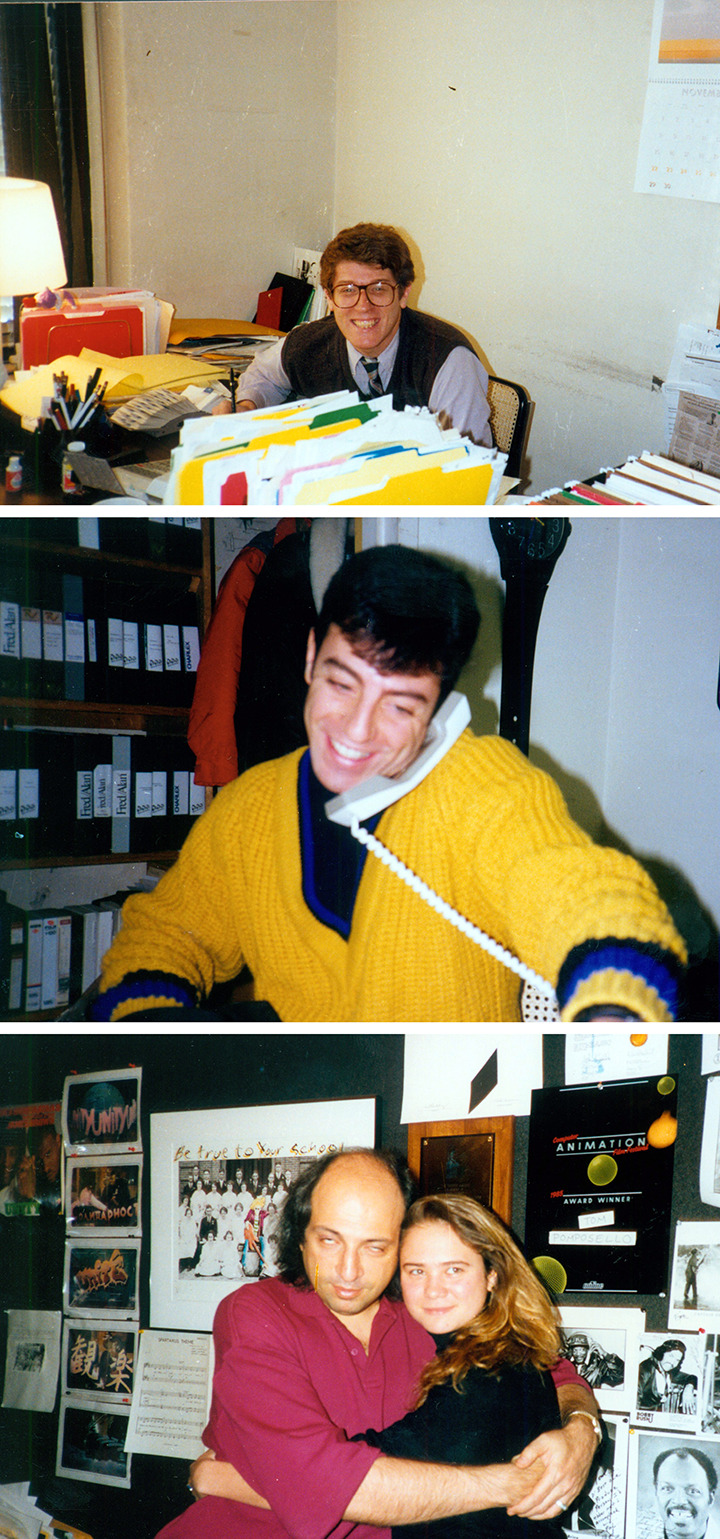
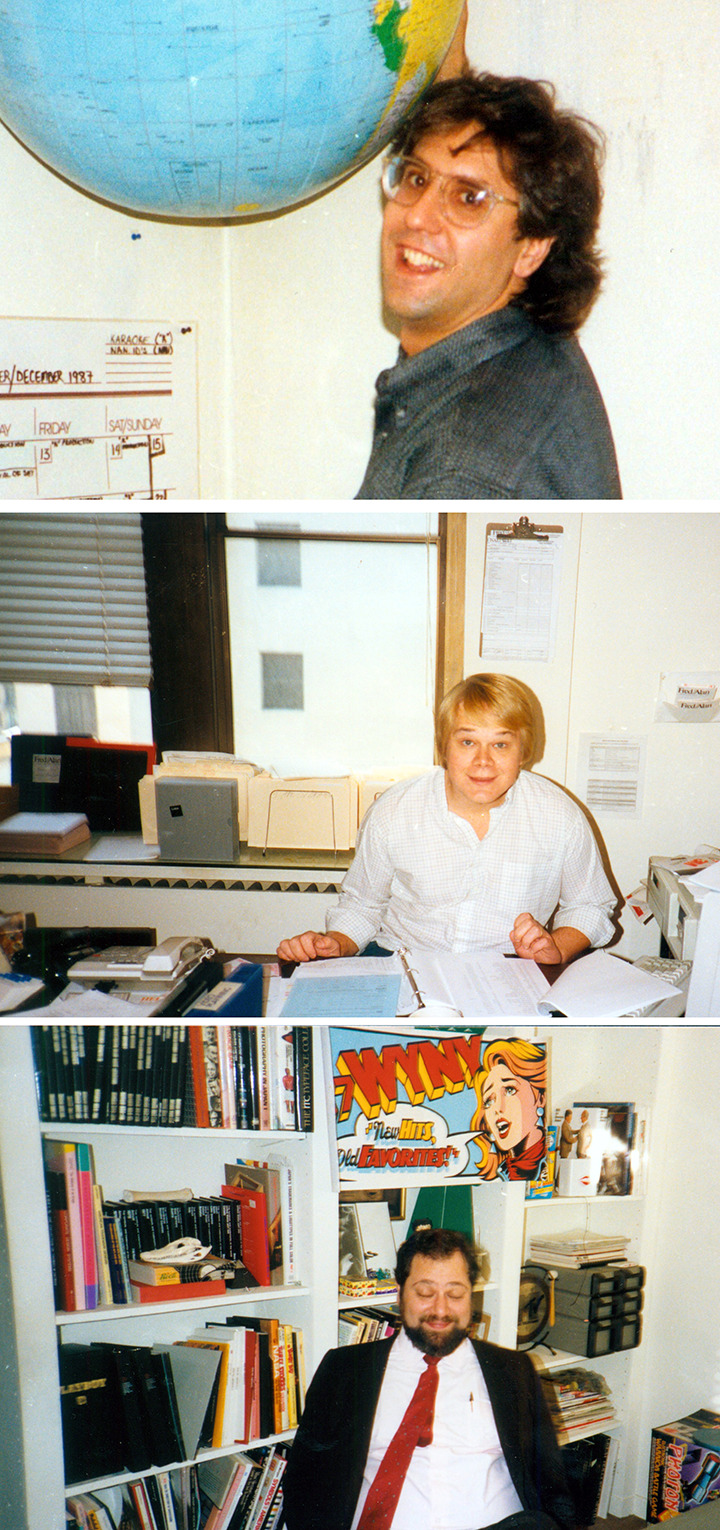
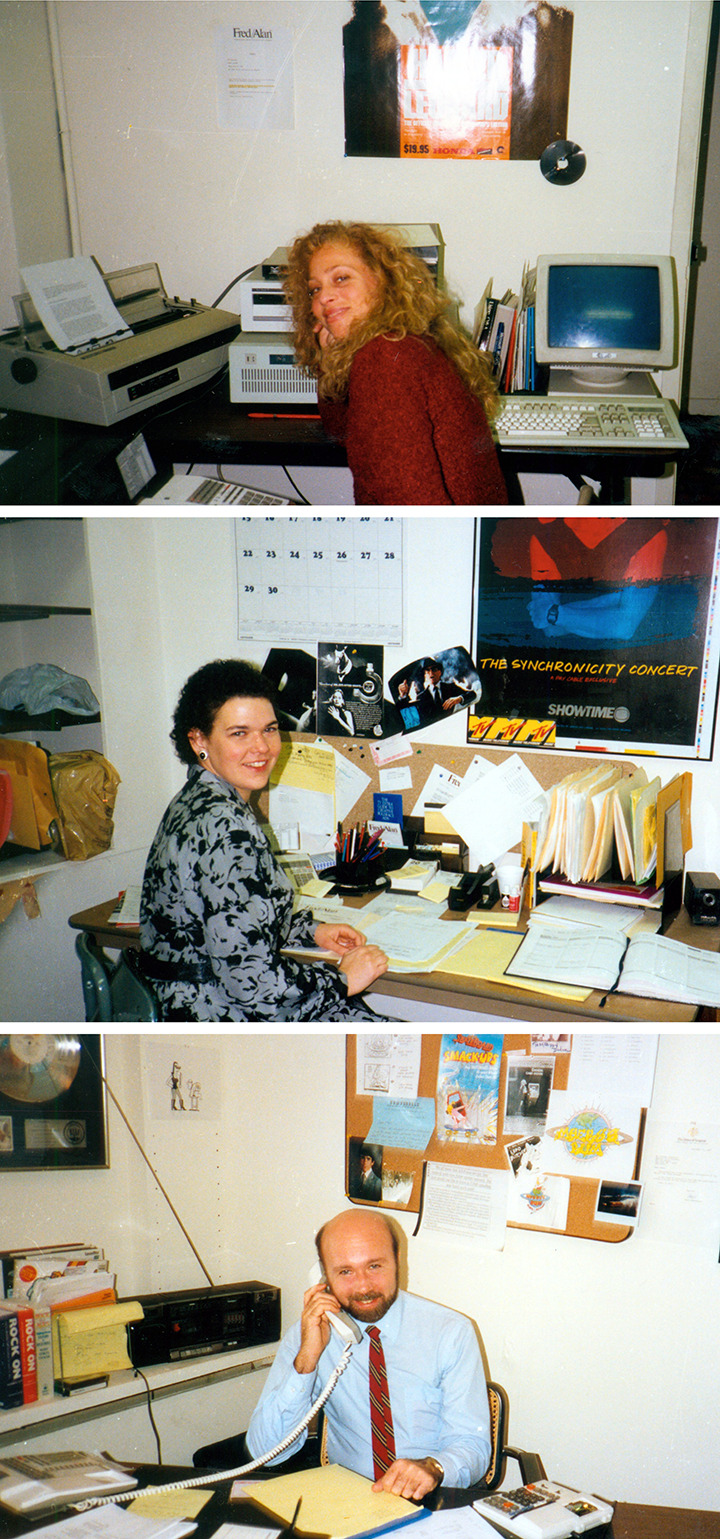
Hangin’ at 870.
The first Fred/Alan office was pretty funky. At the top of a mid-priced Manhattan, New York hotel at 870 7th Avenue, was a hastily assembled tower, only accessible by going to the top floor of the hotel and then squeezing into an elevator the size of a large phone booth.
When you got off on our floor –not for nothing, the original Jackie Gleason production company– you saw stucco stalactites above and pop art rug fragments from every floor in the hotel.

But, like any workplace it was the people who gathered that made the difference. Over the years we had three office locations and about 100 co-workers. On a lot of posts in this archive they get mentioned or credited, but it’s about time we showed some of them from 870 in photos taken around 1987.
Clockwise from the top left corner: Jessica Wolf, Ed Levine, Tom Leonardis, Tom Pomposello and Marietta Szubski, Lori Jacobsen, Nancy Nalven, Mike Shavelson, Elliot Krowe, Chris Strand, Albie Hecht, Janet Gutyan; Marietta Szubski; Nancy; Lori Jacobsen; Barbara Powers, Alan Goodman and Len Fischman.
#Fred/Alan#870 7th Avenue#Tom Pomposello#Ed Levine#Jessica Wolf#Tom Leonardis#Marietta Szubski#Lori Jacobsen#Nancy Nalven#Mike Shavelson#Elliot Krowe#Chris Strand#Albie Hecht#Janet Guytan#Barbara Powers#Alan Goodman#Len Fischman
1 note
·
View note
Photo

For some reason, this 1975 biography of Tom Pomposello (here’s the Wikipedia version) was the only artist bio we ever did at Oblivion. (Maybe that’s because Tom commissioned it himself?!) Mostly we did flyers, which we didn’t even do for Blues from the Apple or the Joe Lee Wilson LP.
All that being said, guitarist and FOT (friend of Tom’s) Mike Bifulco did a fabulous job.
OBLIVION RECORDS
MEDIA
INFORMATION
BIOGRAPHY
HONEST TOM POMPOSELLO
Thomas Anthony Pomposello (dubbed "Honest Tom" during an unsuccessful campaign for Receiver of Taxes in Huntington, Long Island) has been playing and listening to music, especially the blues, for most of his 26 years. Tom's major objective as a musician has been to absorb as much as possible of the authentic blues style by playing and studying with older bluesmen; and then to utilize this background in putting together his own band.
The turning point in Tom's career was his meeting and eventual apprenticeship with the late Mississippi Fred McDowell. Tom acted as Fred's occasional bass player during the period of 1971 through 1973, and eventually spent a short period with Fred at his home in Como, Mississippi. (Fred's last album, the Oblivion record LIVE IN NEW YORK, features Tom on bass and bottleneck guitar.) It was this friendship which provided the inspiration for Tom’s present musical endeavors.
In recent times, Pomposello has performed around New York, playing bass and bottleneck with such blues luminaries as Louisiana Red, Larry Johnson, Lefty Dizz and the late Charles Walker. Currently, he is fronting his own band--an ensemble which he characteristically describes in this manner: "Blues is the basic ingredient, you see. But I'm trying an approach that is a bit eclectic in regards to the music. A bit of rhythm & jump blues, bop, some traditional and country material, Chicago .. . ah, I guess you just gotta hear it." The musicians Tom has assembled include David Longworth on drums, Michael Altshuler on the electric guitar, Bruce Kapler on tenor saxophone and Kid Avanzini on the bass guitar. Tom divides his on-stage time (somewhat unevenly) between the bottleneck/dobro, electric mandolin, harmonica and vocals.
Besides gigging and rehearsing with the band, Tom remains active in other areas of the blues world. His record store, Kropotkin, stocks one of the best blues catalogs in the New York Metropolitan area. He hosts the Saturday afternoon radio show, Something Inside of Me, on WKCR.FM in NewYork City. He acts as contributing editor for Living Blues magazine of Chicago. He does production work for Oblivion Records.
But most importantly, he has just finished work on his first album, HONEST TOM POMPOSELLO, scheduled for an early-winter-1975 release. An active year of touring with the band will follow.
By Michael Bifulco
CONTACT: FRED SEIBERT////TELEPHONE IN NEW YORK CITY: (212) 222.2485
OBLIVION RECORDS, Inc. Box X, Roslyn Heights, NY 11577
(More on Tom Pomposello and the origins of Oblivion here...)
1 note
·
View note
Photo

(L-R) Tom Pomposello, Fred Seibert, Bob Aponte @Heckscher Park, Huntington, Long Island, New York 1972 (photographer unknown)
Several months after we recorded Fred McDowell at the Village Gaslight for “Live in New York,” Tom Pomposello was performing on guitar in our Long Island hometown with bassist Bob Aponte, who'd record with Tom on his debut album a couple of years later.
This photo turned up in a musical reminiscence from a high school friend of my sister’s...
1 note
·
View note
Photo

Smile!
FredFilms Postcard Series 5.6
Tom Pomposello was my great friend, first business partner (in Oblviion Records) and colleague. He passed away in a car accident in 1999, but I’ll always remember his hearty laughs and wry smiles.
.....
From the postcard back:
Congratulations!
You are one of 125 people
to receive this limited edition
FredFilms postcard!
www.fredfilms.com
Smile!
A FredFilms public service
Tom Pomposello
Polaroid Big Shot
Photograph by Roy Langbord & Fred Seibert
WKCR-FM, Columbia University
1974
Series 5.6 [mailed out June 15, 2022]
#FredFilms postcards#Series 5#Smile!#Tom Pomposello#Polaroid Big Shot#postcards#postcard#WKCR#Columbia University
0 notes
Photo
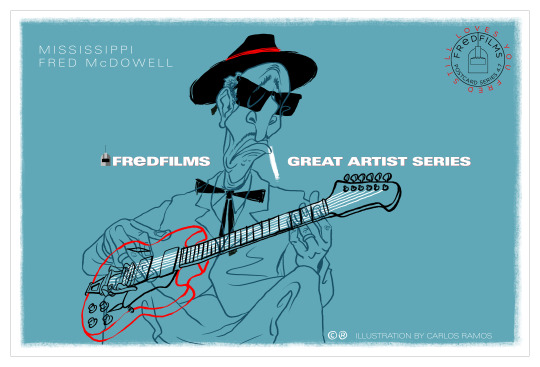
Fred loves Fred (McDowell)!
FredFilms Postcard Series 4.7
We all take inspiration where we can get it. Me, it’s music and musicians. After all, when The Beatles came to America in 1964, they completely derailed me from a life in science to decades enmeshed in pop culture.
Loving music –not just the songs and records, but also how the musicians looked at their art– led me to producing records, and the vinyl LP covers led me into photography, illustration and graphic design. Which led me to cable television and creating the first television brandings, and then to cartoon production. Which led to the internet and streaming video.
Mississippi Fred McDowell was a bluesman whose concert became my first record production. But more importantly, thanks to my first professional partner, Tom Pomposello, Fred was from whom I learned what the blues really is. Hint: not the British rockers I thought it might be at first.
Not for nothing, Fred is not the only incredible artist honored in this card. Carlos Ramos was part of my first Frederator production, Oh Yeah! Cartoons. He’s also totally into music, so I commissioned him to illustrate Fred for an album project I haven’t gotten around to yet.
......
From the postcard back:
Congratulations!
You are one of 125 people
to receive this limited edition
FredFilms postcard!
www.fredfilms.com
FredFilms Great Artist Series
Mississippi Fred McDowell
Illustration by Carlos Ramos
March 2018
Series 4.5 [mailed out November 13, 2023]
#FredFilms postcards#Series 4#Mississippi Fred McDowell#FredFilms Great Artist Series#postcard#Carlos Ramos#postcards#illustration
7 notes
·
View notes
Photo
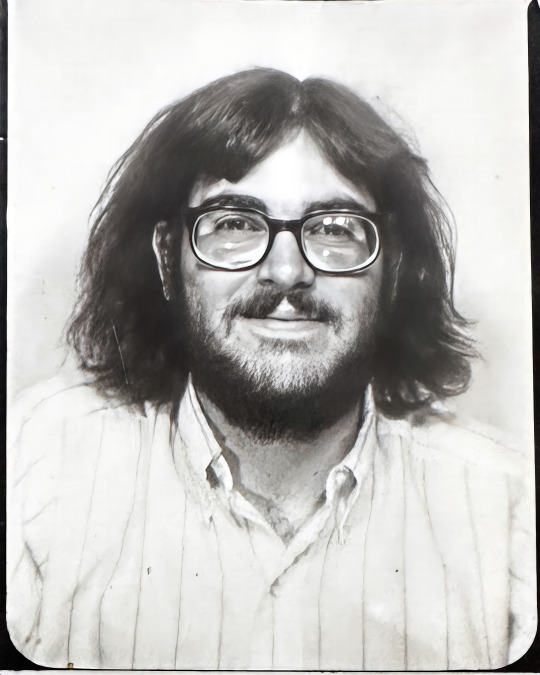
Alan Goodman, photobooth 1970's
Alan saved the day.
”Jazz Ain’t Nothin’ But Soul” Part 2 (Part 1 here)
TThrough some dumb luck and a belief in our artist, Oblivion almost had a hit with “Jazz Ain’t Nothin’ But Soul.” To my ears, and on Van Jay’s mainstream jazz show on WRVR-FM in New York, Joe got it just right, a performance that hit it better than Betty Carter’s original or any others, with an exuberance and joie de vivre that let anyone listening that jazz was... it!
youtube
But, I had completely screwed up.
Sure, Van was playing the track like crazy, and the rest of the RVR jocks followed. We were getting calls from retailers throughout the New York metropolitan area, they wanted to record! Yay!
Nooooo!!!!! The record I’d delivered to the radio station was a test pressing! The only copy we had. And, to add insult to injury, Oblivion was pretty much broke. I was just out of college without a job, Tom Pomposello ran a small record store that gave him enough money to shelter his young family, and Dick Pennington –our initial financial savior– didn't have any more resources for us.. We had the test pressing, but we hadn’t OK’d the pressing order at the plant because we couldn’t pay for it!
My buddy Alan Goodman stepped in and saved the day. He provided us with some cash from an inheritance. What a friend. He was pretty much living hand to mouth himself, but after he bought himself a 16mm movie camera –Alan was in film school– he gave me the rest. It enabled us to make the pressing order.
(I never paid Alan back directly. But, I tried to make up for it, working at MTV together, changing the way people used TV in the cable era. We eventually become partners in the world’s first media branding company, and becoming brothers-in-law and lifetime friends!)
We eventually got the records, sent them to retail, but... it was too late. We’d missed the window.
I made a total rookie error. “Jazz Ain’t...” became a classic “turntable hit.” It deprived Joe –and Oblivion– of a real hit, the only one he’d have in his career. I’ve never forgiven myself, Joe deserved better.
0 notes
Photo


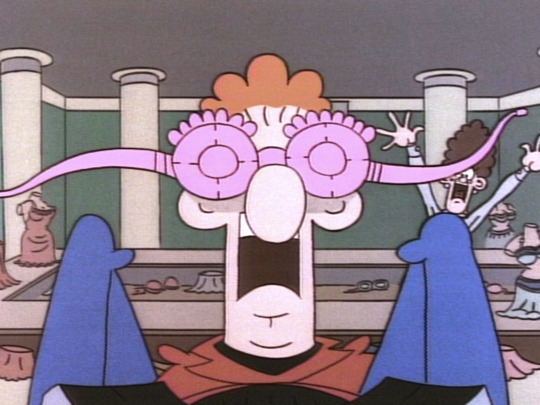



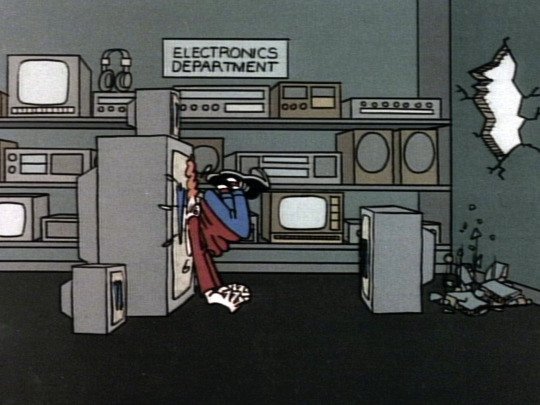

VH-1: Video Hits One 1989
Best of Original Cartoons
Fred/Alan, Inc. New York
VH1 has struggled for years for an identity, and even more, for a successful programming format. Fred/Alan worked with them from their launch in 1985, through at least three or four failed iterations until Alan and I closed the
company in 1992.
The one purely hand drawn, 2D animation we did forT them was in 1989. Fred/Alan creative director Bill Burnett had a fantastic idea. The target audience was baby boomers (like Bill, Fred and Alan were) and one of the baby boom media icons was the satire and humor publication MAD Magazine. Bill engaged their classic comic illustrator Don Martin to storyboard a VH1 commercial to a score that included the last chord of The Beatles' masterpiece "A Day in the Life."
Did it work? Creatively, that's a big "yes."
Ratings? Not so much. And so it goes.
VH1 television commercial 1989
Executive creative directors:
Alan Goodman & Fred Seibert
Writer/Creative director: Bill Burnett
Fred/Alan Producer: Tom Pomposello
Production company: The Ink Tank
The Ink Tank Executive Producer: JJ Sedelmaier
Director: Tony Eastman
.....
Pages 256 & 257 “The Best of Original Cartoons-Produced by Fred Seibert”
#7 The FredFilms Professional Library (Amazon)
#Best of Original Cartoons#VH1#1989#Alan Goodman#Bill Burnett#jj sedelmaier#RO Blechman#branding#advertising
0 notes
Photo
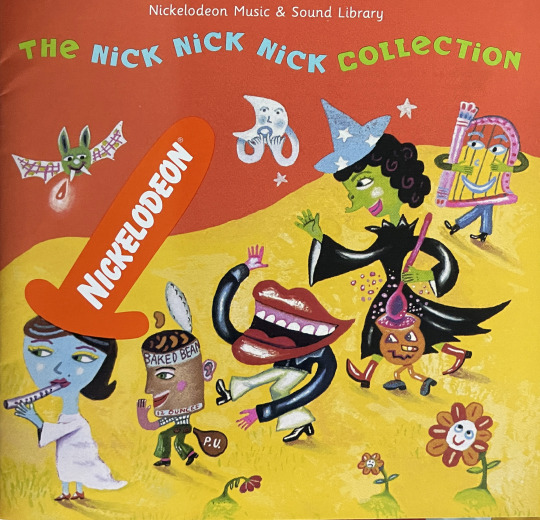
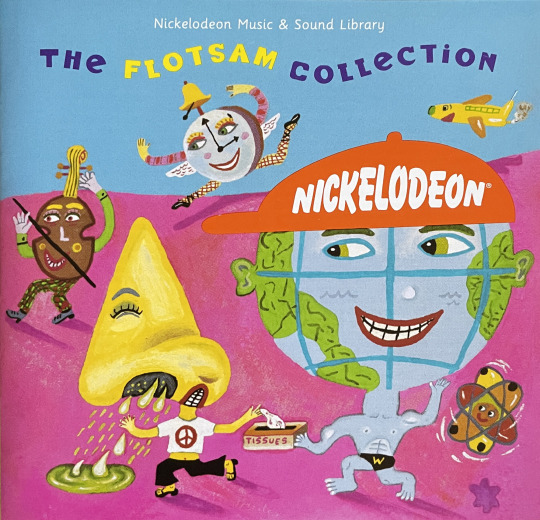
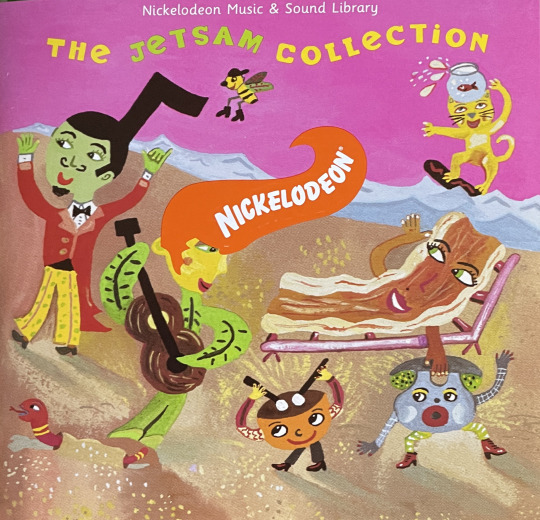
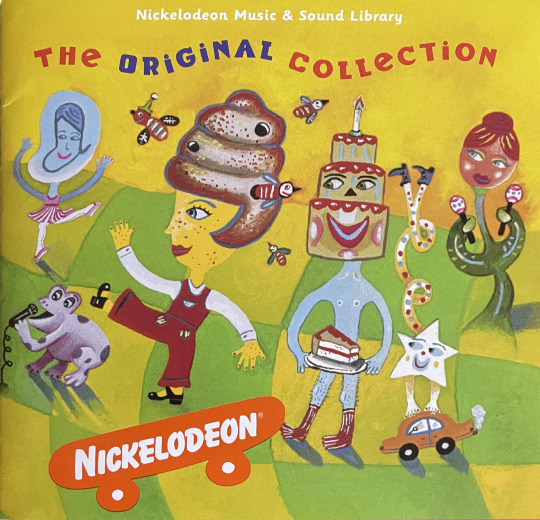
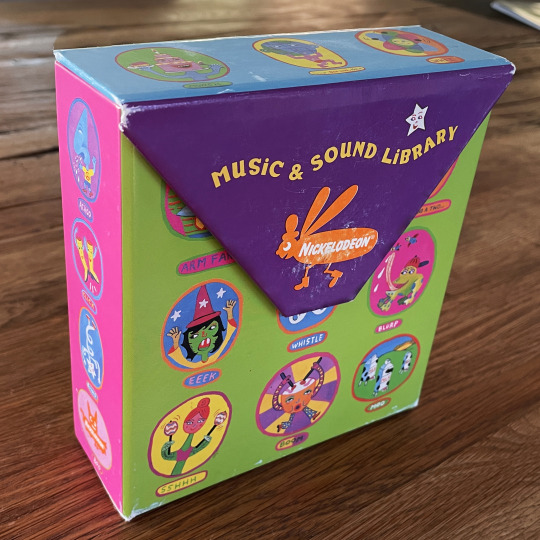
The Nickelodeon Music & Sound Box Set and CDs
The Nickelodeon Music & Sound Library 1996
In June 1984, Fred/Alan booked it’s first major job, the turnaround of Nickelodeon. MTV Networks boss, Bob Pittman, asked Fred and Alan to try and bring their perspective to helping the kids channel climb out of the ratings basement it in which it found itself.
Aside from the strategic thinking we brought to programmers Gerry Laybourne and Debby Beece, we knew we needed some executional magic. And since we had a counter intuitive philosophy for a visual medium like television –that is, innovative visuals and programming should leap from the sound– we started a brainstorm as to what Nickelodeon should sound like. The amazing pictures would follow when the animators were inspired by the music.
We were fascinated with bringing back the jingle sounds of Top 40 radio. We finally got there in the early 90s on VH1, but at the Nickelodeon moment we were focused on a sound that in our little minds was a spin-off/adaptation of jingles. That is, the a cappella singing of Black Americans. We’d already experimented for The Playboy Channel and Showtime with our new friends Eugene Pitt and The Jive Five. We loved the results and realized Eugene’s group could be the perfect engine for Nickelodeon. (Most of the tracks on The Nick Nick Nick Collection below are the soundtracks of these aninmations.)
With little prompting, Fred will recall the moment that Alan improvised on the opening of The Marcels’ “Blue Moon“ ... “Ni Ni Ni Nick-el-o-de-oooonnn!” What kid could resist it?!
Alan went on to finish the now classic song with our colleague (and my former record company partner) Tom Pomposello and Eugene, and the rest is a small part of television history. (I can’t think of any other TV network that had such wonderful music [or any actual music] as its branding centerpiece.)
A decade later, Fred/Alan had closed, but Tom continued to produce special work for Nickelodeon, Nick-at-Nite and other cable channels. And Nick’s super smart, super talented worldwide creative director, Scott Webb, commissioned song after sound after song, eventually there was enough that he thought it was time to collect it all for the then global Nickelodeons to use whenever they saw fit.
You can hear it all if you scroll to the bottom of this post, and right below here is the transcript of the essays by Tom and Scott included with the CD booklets included in the box set.
.....
When Geraldine Laybourne inherited the top position at Nickelodeon, the network had the unpopular reputation (with kids) of being the "good for you" channel. Parents thought the idea was great - but their kids wanted nothing to do with it. Her job was to tum Nickelodeon around and make it a place that really was for kids. For help she turned to one of the most media-savvy companies in the industry - the New York-based Fred/Alan, Inc. Partners Fred Seibert and Alan Goodman headed up a brain trust/consortium that specialized in creating network identities. Their track record was impeccable, having helped launch the wildly successful MTV (Music Television). At that time, I was a producer/creative director and composer associated with the company and the three of us immersed ourselves in our new Nickelodeon challenge.
Creating an identity for a network is almost like inventing a person. You have to decide what they'll look like, what they'll sound like and what they'll say. From the outset, we agreed to place equal emphasis on developing a visual style and an audio sensibility. Both qualities had to be appealing and unique to Nickelodeon.
Much of my work with Fred and Alan revolved around sound design ... and so began a series of great freewheeling conversations about what the sound basis of Nickelodeon would be. We started tossing around ideas and what kept coming up was doo wop music. The more we talked about it, the more sure we felt doo wop would be the ideal sound for a kids' network.
Doo wop developed as street-corner singing. It was a people's music. You didn't need expensive electronic studio equipment you just needed your vocal chords and a desire to make sound: a natural for kids. Anyone could sing along with those doo wop nonsense syllables. And the beauty of using "antique" doo wop harmonies as a signature for a kids' network was that, for kids in 1984, it was a brand new sound! Unlike what their big brothers or sisters were listening to on the radio, this music was just for them.
One of our friends, Marty Pekar, had recently started a record label and was working on a revival of doo wop music. He was nuts about one of the groups he was recording: the Jive Five. We all remembered their hit records from our teen years - "My True Story" and "I'm a Happy Man" (the latter was perhaps the last doo wop record to make the charts, and was a hit in 1965 while the Beatles and the British invasion were in full swing). It wasn't long before I started working with the great gentleman of doo wop himself, the leader of the Jive Five, Eugene Pitt.
Now, Eugene is one of the finest singers who ever emerged from the genre. He can sing baritone or falsetto, but he's as good a lead singer and doo wop balladeer as has ever been. Eugene truly is the unsung (pun intended) hero of the Nick sound and his contribution to Nickelodeon as a singer and lyricist can't be overstated.
One of the best choices we made was to work with this real-life street corner rock 'n' roll group, rather than studio musicians or jingle singers. This was honest-rootsy-gritty-folksy-get-down-and-be-real a cappella singing. Kids intuitively know the difference between real and sanitized. And we committed ourselves to always be authentic in our communication to our audience.
The other coup was the decision to treat "Nickelodeon" as a sound rather than a word. (Who knows what a "nickelodeon" is anyway? To kids, it's just a funny-sounding word.) Entire songs were written in which "Nickelodeon" was the only word. Playing with the word "Nickelodeon" musically turned it into the ultimate audio logo - as distinctive and infectious as a jingle, without any offensive sloganeering attached. Just pure, lively, good-time doo wop.
Once our doo wop tracks were married with the also-celebrated animated IDs, the ftnishing touch was sound effects. The initial sound effect tone (this time no pun intended) was set by the wild English sound effects maestro, Tom Clack, of Manhattan's Clack Studios. Tom is a veteran of the BBC and has created sound effects for about a million radio commercials as well as for TV and film soundtracks and record albums.
It was in Tom's studio that we post-scored many of the 10-second tracks for the original animated Nick network identity spots. Though there aren't many of these tracks represented on these CDs, it was Tom's comic sensibility and wacky perspective that informed the whole evolution of the Nick sound. He knew just how and when to punctuate the tracks with a sonic A-bomb or a sublimely subtte splat. ("Sound effects are funny when they're in sequences of threes," he once told me. "Listen. It's 'boink-thwap-plink:' If you just go 'boink-thwap,' it feels quite unsatisfying.") The "Doo Wop Meets Sound Effects" music style is mainly reflected on disc one of this collection [The Nick Nick Nick Collection]. Discs two [The Flotsam Collection, The Jetsam Collection] through four [The Original Collection] contain music inspired by those early tracks.
I saw that a big part of our job was to develop an audio identity for a kids' network that really spoke to kids. Our solution was the marriage of doo wop and wacky sound effects. It was one distinctive, unique way we would communicate the "voice of Nickelodeon."
Did it work?
I'll never forget the time I was walking down Tenth Avenue in Manhattan. It was the spring of 1985. On the street where these little girls jumping rope and keeping time singing "Nick-Nick-Nick:-Nick-N-NickNick-Nick, Nickelodeon." I thought to myself: "Well, I always dreamed of producing a hit record, but little did I imagine it would be the theme to Nickelodeon!"
Tom Pomposello Music Director/Producer/Composer
…..
Tom Pomposello talks about successfully solving a problem using doo wop for Nickelodeon, but the real success was recognizing the power of sound. Sound is often overlooked in creating television and it is often more powerful than people think. For example, you can have your head buried in the refrigerator looking for a snack and miss what's on the screen, but you can't avoid the audio as easily. Sound and music also make a deep emotional impression, like the songs you learn as a kid and never forget.
It shoutd also be noted that it took guts for Gerry Laybourne and Debby Beece to approve the use of doo wop and wacky sound effects for the Nick sound. They originally wanted to go with something more traditional and expected. In any creative endeavor, it takes courage to take risks and be unconventional, but the rewards can be spectacular.
Since the introduction of the Nick doo wop sound in 1984, many talented composers and musicians have built upon and diversified Nick's aural identity. We have always tried to stay away from mercilessly surfing the popular trends in kids' music. Instead, at the heart of our personality there has always been humor, surprise, play, and a love and respect for kids.
The music and sound on these CDs are powerful tools for communicating Nickelodeon's personality. Consider sound as you go about solving your strategic and creative problems, whether you µse these CDs as tracks, elements or inspiration.
Have Fun!
Scott Webb Creative Director, Nickelodeon Fall 1995
.....
Co-conceived by Scott Webb and Tom Pomposello
Executive producer, Creator Director: Scott Webb
Produced and Directed by Tom Pomposello
MUSIC
Production coordination & management: Barbara Powers
Production assistance: Melody Ann Mora
Digitally remastered and processed for CD by Danny Cavacco, This Way Studios, NYC
DESIGN
Art Director: Laura Hinzman
Designer: Masaka Moribayashi
Illustrator: Sarah Schwartz
Project Manager: Wendy Larrabee
Production Manager: Nancy Morelli
Mechanical Production: Kevin Gepford
Pomposello, Inc. wishes to thank Eugene Pitt and the Jive Five, Fred Seibert and Alan Goodman, Tom Clack, Beldeen Fortunado, Marc Chamlin and Geraldine Laybourne
Nickelodeon wishes to thank Robert Farro, Tom Harbeck, Greg Harrell, Lisa Judson, Anne Kreamer, Kim Rosenblum and Dennis Shinners.
…..
NOTICE TO NICKELODEON PRODUCER/PERSONNEL:
Use this music as much as you wish. And remember, each us requires you to file a music cue sheet or music usage report with MTV Networks, ASCAP & BMI title, timing, type of use, composer(s) & publisher(s). It’s a mandatory requirement of compliance.
…..
©1996, Viacom International, Inc. All rights reserved.
For promotional use only. Not for sale.
Fred Seibert
·
The Nick Nick Nick Collection
>
Fred Seibert
·
The Flotsam Collection
Fred Seibert
·
The Jetsam Collection
The Original Collection
#Nickelodeon#Scott Webb#Tom Pomposello#Alan Goodman#Eugene Pitt#Jive Five#branding#Doo-Wop#music#jingles#1996
52 notes
·
View notes